The magazine of Glion Institute of Higher Education
- What is tourism and hospitality?

Tourism and hospitality are thriving industries encompassing many sectors, including hotels, restaurants, travel, events, and entertainment.
It’s an exciting and dynamic area, constantly evolving and adapting to changing customer demands and trends.
The tourism and hospitality industry offers a diverse range of career opportunities that cater to various interests, skills, and qualifications, with positions available from entry-level to executive management.
The booming tourism and hospitality industry also offers job security and career growth potential in many hospitality-related occupations.

What is tourism?
Tourism is traveling for leisure, pleasure, or business purposes and visiting various destinations, such as cities, countries, natural attractions, historical sites, and cultural events, to experience new cultures, activities, and environments.
Tourism can take many forms, including domestic, or traveling within your country, and international tourism, or visiting foreign countries.
It can also involve sightseeing, adventure tourism , eco-tourism, cultural tourism, and business tourism, and it’s a huge contributor to the global economy, generating jobs and income in many countries.
It involves many businesses, including airlines, hotels, restaurants, travel agencies, tour operators, and transportation companies.
What is hospitality?
Hospitality includes a range of businesses, such as hotels, restaurants, bars, resorts, cruise ships, theme parks, and other service-oriented businesses that provide accommodations, food, and beverages.
Hospitality is all about creating a welcoming and comfortable environment for guests and meeting their needs.
Quality hospitality means providing excellent customer service, anticipating guests’ needs, and ensuring comfort and satisfaction. The hospitality industry is essential to tourism as both industries often work closely together.
What is the difference between tourism and hospitality?
Hospitality and tourism are both related and separate industries. For instance, airline travel is considered as part of both the tourism and hospitality industries.
Hospitality is a component of the tourism industry, as it provides services and amenities to tourists. However, tourism is a broader industry encompassing various sectors, including transportation, accommodation, and attractions.
Transform your outlook for a successful career as a leader in hospitality management
This inspiring Bachelor’s in hospitality management gives you the knowledge, skills, and practical experience to take charge and run a business

Is tourism and hospitality a good career choice?
So, why work in hospitality and tourism? The tourism and hospitality industry is one of the fastest-growing industries in the world, providing a colossal number of job opportunities.
Between 2021 and 2031, employment in the hospitality and tourism industry is projected to expand faster than any other job sector, creating about 1.3 million new positions .
A tourism and hospitality career can be a highly rewarding choice for anyone who enjoys working with people, has a strong service-oriented mindset, and is looking for a dynamic and exciting career with growth potential.
Growth and job opportunities in tourism and hospitality
Tourism and hospitality offers significant growth and job opportunities worldwide. The industry’s increasing demand for personnel contributes to economic and employment growth, particularly in developing countries.
The industry employs millions globally, from entry-level to high-level management positions, including hotel managers, chefs, tour operators, travel agents, and executives.
It provides diverse opportunities with great career progression and skill development potential.
Career paths in tourism and hospitality

There are many career opportunities in tourism management and hospitality. With a degree in hospitality management, as well as relevant experience, you can pursue satisfying and fulfilling hospitality and tourism careers in these fields.
Hotel manager
Hotel managers oversee hotel operations. They manage staff, supervise customer service, and ensure the facility runs smoothly.
Tour manager
Tour managers organize and lead group tours. They work for tour companies, travel agencies, or independently. Tour managers coordinate a group’s transportation, accommodations, and activities, ensuring the trip runs to schedule.
Restaurant manager
Restaurant managers supervise the daily operations of a restaurant. They manage staff, ensure the kitchen runs smoothly, and monitor customer service.
Resort manager
Resort managers supervise and manage the operations of a resort. From managing staff to overseeing customer service, they ensure the entire operation delivers excellence.
Entertainment manager
Entertainment managers organize and oversee entertainment at venues like hotels or resorts. They book performers, oversee sound and lighting, and ensure guests have a great experience.
Event planner
Event planners organize and coordinate events, such as weddings, conferences, and trade shows. They work for event planning companies, hotels, or independently.
vent planners coordinate all aspects of the event, from the venue to catering and decor.
Travel consultant
Travel consultants help customers plan and book travel arrangements, such as flights, hotels, and rental cars. They work for travel agencies or independently. Travel consultants must know travel destinations and provide superb customer service.
What skills and qualifications are needed for a career in tourism and hospitality?

Tourism and hospitality are rewarding industries with growing job opportunities. Necessary qualifications include excellent skills in communication, customer service, leadership, problem-solving, and organization along with relevant education and training.
Essential skills for success in tourism and hospitality
A career in the tourism and hospitality industry requires a combination of soft and technical skills and relevant qualifications. Here are some of the essential key skills needed for a successful career.
- Communication skills : Effective communication is necessary for the tourism and hospitality industry in dealing with all kinds of people.
- Customer service : Providing excellent customer service is critical to the success of any tourism or hospitality business . This requires patience, empathy, and the ability to meet customers’ needs.
- Flexibility and adaptability : The industry is constantly changing, and employees must be able to adapt to new situations, be flexible with their work schedules, and handle unexpected events.
- Time management : Time management is crucial to ensure guest satisfaction and smooth operations.
- Cultural awareness : Understanding and respecting cultural differences is essential in the tourism and hospitality industry, as you’ll interact with people from different cultures.
- Teamwork : Working collaboratively with colleagues is essential, as employees must work together to ensure guests have a positive experience.
- Problem-solving : Inevitably, problems will arise, and employees must be able to identify, analyze, and resolve them efficiently.
- Technical skills : With the increasing use of technology, employees must possess the necessary technical skills to operate systems, such as booking software, point-of-sale systems, and social media platforms.
Revenue management : Revenue management skills are crucial in effectively managing pricing, inventory, and data analysis to maximize revenue and profitability
Master fundamental hospitality and tourism secrets for a high-flying career at a world-leading hospitality brand
With this Master’s degree, you’ll discover the skills to manage a world-class hospitality and tourism business.

Education and training opportunities in tourism and hospitality
Education and training are vital for a hospitality and tourism career. You can ensure you are prepared for a career in the industry with a Bachelor’s in hospitality management and Master’s in hospitality programs from Glion.
These programs provide a comprehensive understanding of the guest experience, including service delivery and business operations, while developing essential skills such as leadership, communication, and problem-solving. You’ll gain the knowledge and qualifications you need for a successful, dynamic, and rewarding hospitality and tourism career.
Preparing for a career in tourism and hospitality
To prepare for a career in tourism and hospitality management, you should focus on researching the industry and gaining relevant education and training, such as a hospitality degree . For instance, Glion’s programs emphasize guest experience and hospitality management, providing students with an outstanding education that launches them into leading industry roles.
It would help if you also worked on building your communication, customer service, and problem-solving skills while gaining practical experience through internships or part-time jobs in the industry. Meanwhile, attending industry events, job fairs, and conferences, staying up-to-date on industry trends, and networking to establish professional connections will also be extremely valuable.
Finding jobs in tourism and hospitality
To find jobs in tourism and hospitality, candidates can search online job boards, and company career pages, attend career fairs, network with industry professionals, and utilize the services of recruitment agencies. Hospitality and tourism graduates can also leverage valuable alumni networks and industry connections made during internships or industry projects.
Networking and building connections in the industry
Networking and building connections in the hospitality and tourism industry provide opportunities to learn about job openings, meet potential employers, and gain industry insights. It can also help you expand your knowledge and skills, build your personal brand, and establish yourself as a valuable industry professional.
You can start networking by attending industry events, joining professional organizations, connecting with professionals on social media, and through career services at Glion.
Tips for success in tourism and hospitality

Here are tips for career success in the tourism and hospitality industry.
- Gain relevant education and training : Pursue a hospitality or tourism management degree from Glion to gain fundamental knowledge and practical skills.
- Build your network : Attend industry events, connect with colleagues and professionals on LinkedIn, and join relevant associations to build your network and increase your exposure to potential job opportunities.
- Gain practical experience : Look for internships, part-time jobs, or volunteering opportunities to gain practical experience and develop relevant skills.
- Develop your soft skills : Work on essential interpersonal skills like communication, empathy, and problem-solving.
- Stay up-to-date with industry trends : Follow industry news and trends and proactively learn new skills and technologies relevant to tourism and hospitality.
- Be flexible and adaptable : The tourism and hospitality industry constantly evolves, so be open to change and to adapting to new situations and challenges.
- Strive for excellent guest service : Focus on delivering exceptional guest experiences as guest satisfaction is critical for success.
Tourism and hospitality offer many fantastic opportunities to create memorable guest experiences , work in diverse and multicultural environments, and develop transferable skills.
If you’re ready to embark on your career in tourism and hospitality, Glion has world-leading bachelor’s and master’s programs to set you up for success.
Photo credits Main image: Maskot/Maskot via Getty Images

Hospitality internships

LISTENING TO LEADERS

LIVING WELL

HOSPITALITY UNCOVERED

BUSINESS OF LUXURY

WELCOME TO GLION.
This site uses cookies. Some are used for statistical purposes and others are set up by third party services. By clicking ‘Accept all’, you accept the use of cookies
Privacy Overview

Want to create or adapt books like this? Learn more about how Pressbooks supports open publishing practices.
Chapter 1. History and Overview
1.1 What is Tourism?
Before engaging in a study of tourism , let’s have a closer look at what this term means.
Definition of Tourism
There are a number of ways tourism can be defined, and for this reason, the United Nations World Tourism Organization (UNWTO) embarked on a project from 2005 to 2007 to create a common glossary of terms for tourism. It defines tourism as follows:
Tourism is a social, cultural and economic phenomenon which entails the movement of people to countries or places outside their usual environment for personal or business/professional purposes. These people are called visitors (which may be either tourists or excursionists; residents or non-residents) and tourism has to do with their activities, some of which imply tourism expenditure (United Nations World Tourism Organization, 2008).
Using this definition, we can see that tourism is not just the movement of people for a number of purposes (whether business or pleasure), but the overall agglomeration of activities, services, and involved sectors that make up the unique tourist experience.
Tourism, Travel, and Hospitality: What are the Differences?
It is common to confuse the terms tourism , travel , and hospitality or to define them as the same thing. While tourism is the all-encompassing umbrella term for the activities and industry that create the tourist experience, the UNWTO (2020) defines travel as the activity of moving between different locations often for any purpose but more so for leisure and recreation (Hall & Page, 2006). On the other hand, hospitality can be defined as “the business of helping people to feel welcome and relaxed and to enjoy themselves” (Discover Hospitality, 2015, p. 3). Simply put, the hospitality industry is the combination of the accommodation and food and beverage groupings, collectively making up the largest segment of the industry (Go2HR, 2020). You’ll learn more about accommodations and F & B in Chapter 3 and Chapter 4 , respectively.
Definition of Tourist and Excursionist
Building on the definition of tourism, a commonly accepted description of a tourist is “someone who travels at least 80 km from his or her home for at least 24 hours, for business or leisure or other reasons” (LinkBC, 2008, p.8). The United Nations World Tourism Organization (1995) helps us break down this definition further by stating tourists can be:
- Domestic (residents of a given country travelling only within that country)
- Inbound (non-residents travelling in a given country)
- Outbound (residents of one country travelling in another country)
Excursionists on the other hand are considered same-day visitors (UNWTO, 2020). Sometimes referred to as “day trippers.” Understandably, not every visitor stays in a destination overnight. It is common for travellers to spend a few hours or less to do sightseeing, visit attractions, dine at a local restaurant, then leave at the end of the day.
The scope of tourism, therefore, is broad and encompasses a number of activities and sectors.
Spotlight On: United Nations World Tourism Organization (UNWTO)
UNWTO is the United Nations agency responsible “for the promotion of responsible, sustainable and universally accessible tourism” (UNWTO, 2014b). Its membership includes 159 countries and over 500 affiliates such as private companies, research and educational institutions, and non-governmental organizations. It promotes tourism as a way of developing communities while encouraging ethical behaviour to mitigate negative impacts. For more information, visit the UNWTO website .
NAICS: The North American Industry Classification System
Given the sheer size of the tourism industry, it can be helpful to break it down into broad industry groups using a common classification system. The North American Industry Classification System (NAICS) was jointly created by the Canadian, US, and Mexican governments to ensure common analysis across all three countries (British Columbia Ministry of Jobs, Tourism and Skills Training, 2013a). The tourism-related groupings created using NAICS are (in alphabetical order):
- Accommodation
- Food and beverage services (commonly known as “F & B”)
- Recreation and entertainment
- Transportation
- Travel services
These industry groups (also commonly known as sectors) are based on the similarity of the “labour processes and inputs” used for each (Government of Canada, 2013). For instance, the types of employees and resources required to run an accommodation business whether it be a hotel, motel, or even a campground are quite similar. All these businesses need staff to check in guests, provide housekeeping, employ maintenance workers, and provide a place for people to sleep. As such, they can be grouped together under the heading of accommodation. The same is true of the other four groupings, and the rest of this text explores these industry groups, and other aspects of tourism, in more detail.

It is typical for the entire tourist experience to involve more than one sector. The combination of sectors that supply and distribute the needed tourism products, services, and activities within the tourism system is called the Tourism Supply Chain. Often, these chains of sectors and activities are dependent upon each other’s delivery of products and services. Let’s look at a simple example below that describes the involved and sometimes overlapping sectoral chains in the tourism experience:
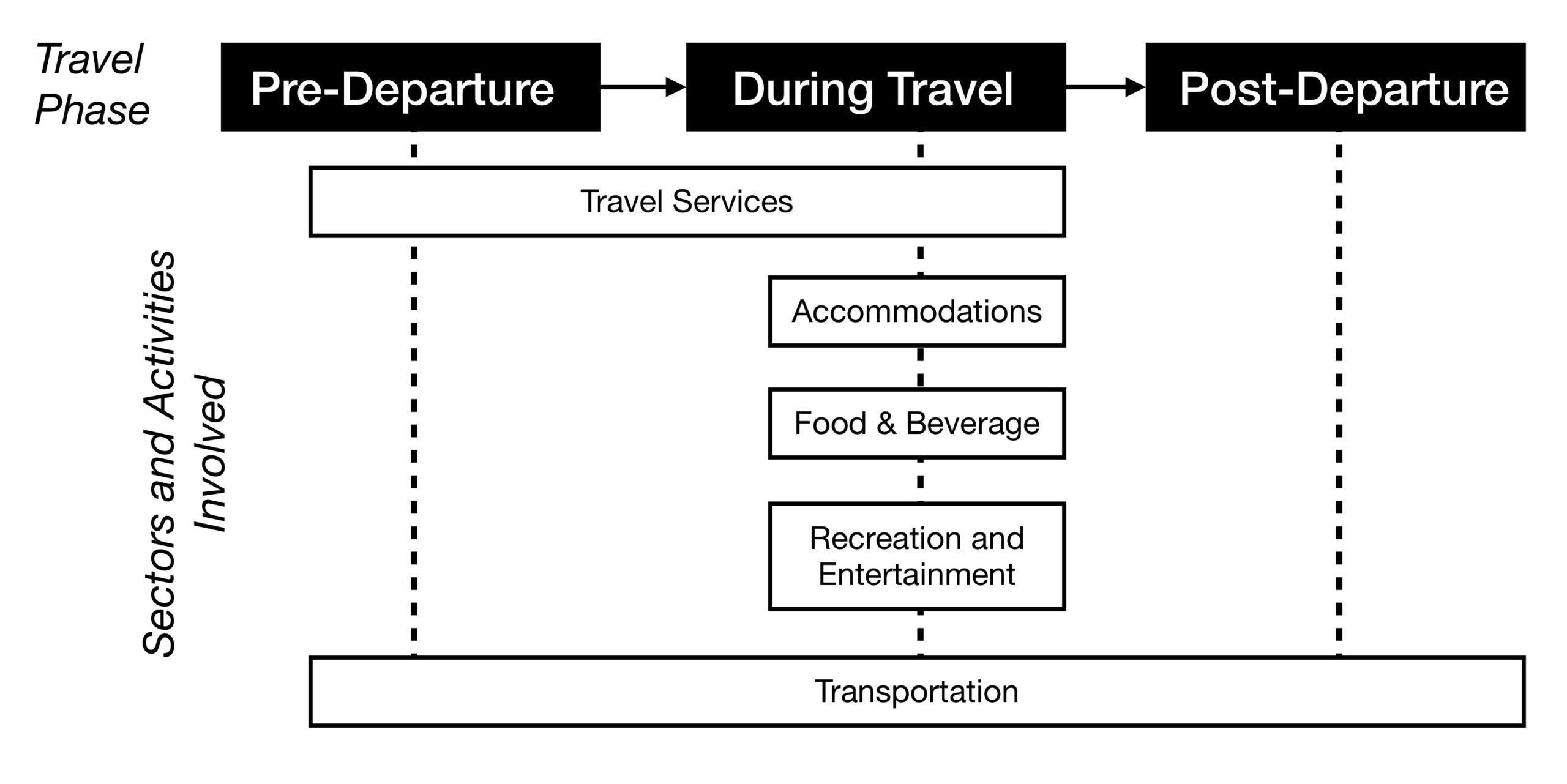
Before we seek to understand the five tourism sectors in more detail, it’s important to have an overview of the history and impacts of tourism to date.
Long Descriptions
Figure 1.2 long description: Diagram showing the tourism supply chain. This includes the phases of travel and the sectors and activities involved during each phase.
There are three travel phases: pre-departure, during travel, and post-departure.
Pre-departure, tourists use the travel services and transportation sectors.
During travel, tourists use the travel services, accommodations, food and beverage, recreation and entertainment, and transportation sectors.
Post-departure, tourists use the transportation sector.
[Return to Figure 1.2]
Media Attributions
- Front Desk by Staying LEVEL is licensed under a CC BY-NC 4.0 Licence .
Tourism according the the UNWTO is a social, cultural and economic phenomenon which entails the movement of people to countries or places outside their usual environment for personal or business/professional purposes.
UN agency responsible for promoting responsible, sustainable, and universally accessible tourism worldwide.
Moving between different locations for leisure and recreation.
The accommodations and food and beverage industry groupings.
someone who travels at least 80 km from his or her home for at least 24 hours, for business or leisure or other reasons
A same-day visitor to a destination. Their trip typically ends on the same day when they leave the destination.
A way to group tourism activities based on similarities in business practices, primarily used for statistical analysis.
Introduction to Tourism and Hospitality in BC - 2nd Edition Copyright © 2015, 2020, 2021 by Morgan Westcott and Wendy Anderson, Eds is licensed under a Creative Commons Attribution 4.0 International License , except where otherwise noted.
Share This Book

- Why Study hospitality?
- Your Future Career
- Why Choose EHL?
- Awards & Rankings
- Our History
- Academic Governance
- Accreditations & Memberships
- Professional Path to the Bachelor Degree
- Preparatory Year
- Student Business Projects
- Bachelor Internships
- Direct Entries & Transfers
- EHL Junior Academy Campus Lausanne
- EHL Junior Academy Campus Singapore
- EHL Junior Academy Campus Passugg
- Master's Degrees
- MBA Programs
- Culinary & Restaurant Management Certificate (CREM)
- Bachelor in Lausanne
- University Transfers & Direct Entries
- Bachelor in Singapore
- Fees for Bachelor students eligible for A-HES
- Learning Philosophy
- Our Faculty
- Swiss Education Excellence
- Research Projects & Publications
- Inauguration
- Student Life in Lausanne
- Campus Lausanne Guided Tour
- Explore Lausanne & Switzerland
- Campus Lausanne Contacts
- Student Life at EHL Campus (Singapore)
- Explore Singapore
- Explore the Region
- Campus (Singapore) Contacts
- Contact our Program Advisors
- Chat with our Students
What is hospitality?
Hospitality means extending a welcome to guests or offering a home away from home, and the word is derived from the Latin word “hospes” meaning host, visitor or stranger. The hospitality and tourism industry is a vast sector that includes all the economic activities that directly or indirectly contribute to, or depend upon, travel, tourism and hospitality.
This industry sector includes:
- Hotels & Resorts
- Restaurants & Catering
- Night Clubs & Bars
- Travel & Transportation
- Spas & Wellness
- Cruise Liners & Bus tours
- Cultural & Sports
- Business Administration (events, communication, customer experience, and many more )

Bachelor of Science in International Hospitality Management
Discover the EHL Bachelor's program meticulously crafted by our Hospitality Management School to meet the evolving needs of the hospitality and tourism industry.
Our curriculum strikes a balance between hands-on experience, academic excellence, and business acumen. It also provides a unique opportunity for students to study in two premier locations: Switzerland and Singapore.
Immerse yourself in practical courses, workshops and two six-month internships, providing real-world insights aligned with industry demands.

The History of Hospitality & Tourism
Hospitality is one of the oldest businesses, going way back to the innkeepers and taverns of biblical times. Tourism, on the other hand, is a more recent invention which began in Europe, with Switzerland being one of the first countries to develop special accommodation and services for travelers.
In the late 1800’s, the concept of leisure tourism and hospitality spread across Europe, bringing flocks of wealthy travelers to Switzerland. It began with visitors seeking cultural and natural exposure on guided tours in the Swiss Alps, train rides and wellness tourism. Palace-style hotels, thermal baths and ski resorts became icons of luxury tourism in Switzerland.
This new generation of wealthy guests had higher expectations for comfortable accommodations, convenient services and fine dining. The leisure travel phenomenon gave birth to hospitality management schools: EHL was founded as the first hotel management school in 1893 in Lausanne, and it has pioneered in hospitality management education since then.
Hospitality is one of the most resilient, adaptable and dynamic industries on the planet. It is an industry of constant change, where technology and innovation are being integrated to improve the guest experience.

What is Tourism and Hospitality Management?
Careers in hospitality management.
Hospitality management is a broad career field that provides many opportunities for international career progression. In the core of the hospitality industry alone (hotels, events, restaurants, etc.) graduates with a hospitality degree can become managers in a variety of departments and sectors, or choose to specialize in one area.
The career paths are as diverse as the industry, and with so many new hospitality concepts and innovation changing the industry, the career paths will continue to grow and evolve with technology and trends of the 21st.
Hospitality education at EHL teaches students to love learning because it takes a scientific approach that sparks curiosity and involves the five senses.
_Faculty%20&%20Students%20Discussion%201.jpg)
What are Hospitality Management Skills?
Studying at ehl, the world's 1st hospitality management school.
In the field of hospitality management, customer satisfaction is key, and the primary goal is to ensure the best customer experience possible. Therefore, hospitality management courses teach both professionally-focused hard skills (room pricing, cost-control, accounting, scheduling, etc. ) and soft skills which are related to how one acts, and interacts in a professional environment.
Training for soft-skills is critical to succeed in the 21st century: critical thinking, agility and adaptability, effective communication, imagination and curiosity: these are all skills students develop at EHL in our hospitality management courses and degrees.
#hospitality-industry
See More Articles

Why hospitality businesses win by putting people first - A mindset shift
May 17, 2024

Guest experiences: Importance of emotional engagement and culture
May 15, 2024

Creating memorable guest experiences: Personalization with storytelling
May 8, 2024
- Bachelor Degree in Hospitality
- Pre-University Courses
- Master’s Degrees & MBA Programs
- Executive Education
- Online Courses
- Swiss Professional Diplomas
- Culinary Certificates & Courses
- Fees & Scholarships
- Bachelor in Hospitality Admissions
- EHL Campus Lausanne
- EHL Campus (Singapore)
- EHL Campus Passugg
- Host an Event at EHL
- Contact our program advisors
- Join our Open Days
- Meet EHL Representatives Worldwide
- Chat with our students
- Why Study Hospitality?
- Careers in Hospitality
- EHL Network of Excellence
- Career Development Resources
- Route de Berne 301 1000 Lausanne 25 Switzerland
- Privacy Policy
- Legal Terms
© 2024 EHL Holding SA, Switzerland. All rights reserved.
- Hospitality Industry
8 lucrative career paths in the hospitality and tourism industry

March 08, 2024 •
8 min reading
The hospitality field is one of the most encompassing industries in the world. It can include every element of vacation, tourism and recreation experiences. This is something our EHL graduates quickly learn as the hospitality industry red carpet rolls out in every possible direction after graduation. When you have hospitality training and experience on your resume, your career potential becomes boundless.
While hospitality may be defined by the hotel industry, the true options are far more vast than you may have imagined. Your skills can take you anywhere in the world, working with any aspect of travel and leisure, from management to experience coordination to supply chain. If you are considering your next step in an illustrious hospitality career , we would like to spotlight eight different career paths that you might take, each encompassing a large sector of the hospitality industry.
Here are eight common sectors where our students find success after graduation.
- Accommodation
- Food & Beverage
- Event Planning
- Sports & Recreation
- Entertainment
- Wellness & Leisure
Careers in accommodation
The accommodation sector has never been more diverse. While there are millions of hotels and resorts around the world, there are also many other types of accommodation you might coordinate, creating perfect vacation experiences of every size and style. There are vacation rentals and, luxury accomodation from palaces and 5-star hotels to luxury rentals. There are cabins, cottages, and destination lodges as well as campgrounds and RV parks. You can help hotels expand their accommodation offerings beyond interior rooms or cultivate unique properties and accommodation experiences.
In another branch, you can take your hospitality experience into the corporate world, helping to facilitate corporate housing which fulfills the needs of traveling, temporary, and relocated professionals who are working away from home. According to the Bureau of Labor Statistics (BLS), 2023 featured nearly 2 million jobs in Accommodation in the US alone.
Each branching accommodation path provides the opportunity to create exquisite stays with the perfect balance of comfort, convenience, and logistics.
Traversing the travel industry
The travel industry often scoops up a percentage of hospitality professionals. 2023 saw over 320 million travel jobs worldwide. Airports and airline hosts rely on hospitality to make air travel more comfortable for their passengers.
Cruise ships make up an enormous global industry and specialize in diverse hospitality experiences from prow to stern. Royal Caribbean Cruises, Carnival, and Norwegian offer the greatest number of cruise ship jobs, but you may have just as much fun with a smaller cruise line that travels coasts that you love.
You can step into the specialized world of chartered travel including chartered planes , boats, helicopters. Or you can join a large travel company providing your hospitality expertise wherever it is needed most. If you love trains, rail travel offers a truly unique opportunity to create on-train hospitality experiences, especially those few great trans-continental train lines still in operation for both tourism and long-distance travel.
Immerse in food & beverage
Our foodie graduates often dive into the experience-rich world of the food and beverage industry. There is simply no end to the food-oriented job opportunities , and these take every possible shape and form.
You could be coordinating banquets for hotel-hosted events or managing a gourmet restaurant anywhere in the world. You can become a caterer or coordinate for a large catering company or you can open your own food establishment somewhere with plenty of demand and tourism to fill your seats.
Food and beverage professionals can join any venue, including theaters, stadiums, event halls, grand hotels, cruise ships, restaurants and restaurant chains - you can even coordinate food for museums, schools, large business facilities, or food truck empires . The possibilities are literally endless, as the food and beverage industry touches every aspect of modern life.

Become an event planning expert
Events are the spice of life. Weddings, conferences, festivals, fashion shows, concerts, theater productions; the list is endless. The BLS predicts 7.5% employment growth for events planning from 2022 to 2032.
You can choose a venue, a favorite event type, or work for an organization that puts on one spectacular event each year. A skilled events coordinator is someone who makes unforgettable moments and large gatherings into a guaranteed success.
Skills that hospitality graduates learn through education and internship are critical for event planning. Highly organized people who thrive in chaos and love adapting to unexpected challenges will typically do well in the events industry. You will also get a chance to work with celebrities of every possible type, from Ted Talk tech leaders to pop stars and Michelin star chefs.
You will build your name making magical events possible, creating impossibly entertaining environments that are also expertly designed to provide everything event-goers and vendors need to bring the experience together.
Creating tourism experiences
Tourism is the art of putting together full-scope travel experiences. There are many areas of tourism, professional in this field arranges tour packages, plans whole trips, or coordinates or hosts excursions for traveling clients.
As people embrace the idea of travel experiences over more chaotic destination immersion, the tourism sector only continues to grow. According to ILO, over 230 million people work in tourism worldwide. This is more than just being a travel agent or a tour guide. Venues, destinations, and even whole cities hire tourism professionals to coordinate desirable tourism packages that will entice visitors to take specific journeys through the available experiences at each destination.
Tourism jobs include destination management, tour package design, personal travel planning, tour coordination, and a certain amount of special event planning. In fact, the tourism industry becomes complex as coordinated events are further integrated into hospitality and travel packages.
If you enjoy many aspects of the hospitality world, enjoying things like wedding planning, travel planning, museum experiences, foodie tours , and personally ensuring that travelers have a wonderful time; tourism might be the perfect career path.
The world of sports & recreation
There is no denying that sports plays a profound role in the travel and hospitality industry. People will cross the world to see their favorite sports team play in an big game - or to experience legendary golf courses in breathtaking global destinations. Some chase the waves for surf and high-adrenaline water sports, some want to swim over every magnificent coral reef that the world's oceans have to offer.
Sports and recreation is a vast sector of the hospitality industry, and one you could become a master of - connecting travelers with the thrilling experiences they have been dreaming about. A sports and recreation professional will specialize in exciting experiences, and you can operate from either end of the process.
You can become a destination coordinator, finding tourists who want to experience the locations and activities of your organization, or you can approach from the travel direction - directing travelers toward the venues and activities they desire. If you understand that need for thrills, personal challenge, and unforgettable moments, you will be able to bond with your clients and help them truly capture the destination sports and recreation experiences they are looking for.
To learn more about what to expect in a hospitality education, chat today with real EHL students about their experience .
The glamorous entertainment industry
Hospitality has always been a gateway into the world of fame and entertainment . Legendary hotels, resorts, and destination venues are often the location of major shows, hosting concerts, after-parties, and other events that become part of celebrity tours. Other venues are popular locations for charity galas and fundraiser events where the rich and famous gather to do their philanthropic work and rub elbows with those who share a different kind of wealth and power.
The BLS predicts jobs in entertainment and recreation management are growing by 8% , which is well above the occupational average.
If you have always wanted to make these glamorous moments into reality with a chance to meet and endless parade of people whose faces are known across the globe, entertainment hospitality is the path for you.
Luxurious wellness and leisure
Perhaps the fastest-growing sector of the hospitality industry, however, is wellness and leisure . It has seen 40% growth through 2023 and is one of the leading growth sectors in the US alone. "Wellness" has become a concept that you see everywhere. It is something we are all focusing on, and in every aspect of life. Mental wellness, workplace wellness, physical wellness, and luxurious wellness are at the top of everyone's mind. It's no surprise that spas, massage studios, salons, and leisure facilities are rapidly growing in ever aspect of hospitality.
Today, when people travel, they want to experience more wellness and luxuriant relaxation than ever before. Every business trip should include at least one day at the spa . Every family vacation will likely include a girl's day out getting pampered. Even eco-tourists are seeking out secluded hot springs and organic facials. Some seek out yoga, pilates, and fitness classes. Some go on retreats or try a guided meditation course. The possibilities are endless.
This vast and growing sector can be found anywhere people travel or vacation. If you specialize in wellness and leisure, you'll find work in every corner of the industry and the world.
The limitless career options of EHL Hospitality Graduates
At EHL, we proudly prepare our students for an illustrious career in the hospitality industry. Your options are not limited just to the traditional roles surrounding hotels or tourism, however. Hospitality is a truly vast industry that encompasses every aspect of travel, events, and experiences. From the many styles of booked accommodation to unique destinations and leisure experiences all over the world - once you are equipped with the hospitality skills and intern experiences learned through EHL education, your potential career paths become truly limitless.
Let your passion and natural talents guide you toward the best path for you. Do you love organizing chaos and seeing events come together? Go into event and venue coordination. Do you love all things food and gourmet? Find your place in the food and beverage world. If you are enchanted by unique experiences, help others find their bliss in tourism or sports recreation. Or, if bliss is your specialty, guide others to the wellness treatments they need to return home feeling refreshed and energized.
Best of all, hospitality skills allow you to pivot at any moment, trying a new branch of the hospitality industry wherever your desire and job opportunities may take you. It all starts here, at EHL hospitality education.

Keep reading

Guest experiences: Importance of emotional engagement and culture
May 15, 2024

Creating memorable guest experiences: Personalization with storytelling
May 08, 2024

Hospitality management careers list for hotel enthusiasts
May 07, 2024
Interested in studying hospitality management in Switzerland?
By earning not only one - but two top hospitality degrees, you will enjoy the hotel management education of the future. Learn more and download the brochure here.
This is a title
This is a text
More articles
- Bachelor Degree in Hospitality
- Pre-University Courses
- Master’s Degrees & MBA Programs
- Executive Education
- Online Courses
- Swiss Professional Diplomas
- Culinary Certificates & Courses
- Fees & Scholarships
- Bachelor in Hospitality Admissions
- EHL Campus Lausanne
- EHL Campus (Singapore)
- EHL Campus Passugg
- Host an Event at EHL
- Contact our program advisors
- Join our Open Days
- Meet EHL Representatives Worldwide
- Chat with our students
- Why Study Hospitality?
- Careers in Hospitality
- Awards & Rankings
- EHL Network of Excellence
- Career Development Resources
- EHL Hospitality Business School
- Route de Berne 301 1000 Lausanne 25 Switzerland
- Accreditations & Memberships
- Privacy Policy
- Legal Terms
© 2024 EHL Holding SA, Switzerland. All rights reserved.

Want to create or adapt books like this? Learn more about how Pressbooks supports open publishing practices.
Chapter 16 Hospitality and Tourism
Learning objectives.
- Understand what tourism is: definition, components, and importance.
- Understand the economic, social, and environmental benefits and costs of tourism.
- Define hospitality and the pineapple tradition.
- Identify the types of hotel categories and how they are determined.
- Examine the different categories of food service operations.
- Understand the different types of events, meetings, and conventions.

The tourism industry is often cited as the largest industry in the world, contributing 10 percent of the world’s GDP. In 2016 there were over 1.2 billion international tourists: that’s a substantial economic impact and movement of goods and services! [1] Tourism is also considered an export and is unique in that the consumers come to the product where it is consumed on-site. Before we dig any deeper, let’s explore what the term “tourism” means.
Definition of Tourism
There are a number of ways tourism can be defined. The United Nations World Tourism Organization (UNWTO) embarked on a project from 2005 to 2007 to create a common glossary of terms for tourism. It defines tourism as follows:
A social, cultural and economic phenomenon which entails the movement of people to countries or places outside their usual environment for personal or business/professional purposes. These people are called visitors (which may be either tourists or excursionists; residents or non-residents) and tourism has to do with their activities, some of which imply tourism expenditure. [2]
In other words, tourism is the movement of people for a number of purposes (whether business or pleasure). It is important to understand the various groups and constituencies involved in this movement. Of course it includes the tourist, but also the vast array of businesses providing goods and services for the tourist, the government and political structure of a destination, and the local residents of the destination community itself. Each of these components are necessary parts of a successful tourism destination and operate within private and public sectors, the built environment, and the natural environment. All these come together to create the processes, activities, and outcomes of tourism.
If it all seems a little overwhelming, it might be helpful to break tourism down into broad industry groups, each of which will be covered in this chapter:
Accommodation and Lodging
- Food and Beverage Services (F & B)
Recreation and Entertainment
- Convention & Event Management
Travel Services
- Private Clubs
Benefits and Costs of Tourism
Tourism impacts can be grouped into three main categories: economic, social, and environmental. These impacts are analyzed using data gathered by businesses, governments, and industry organizations. Some impacts gain more attention than others. It is also important to recognize that different groups and constituencies are impacted differently.
Economic Impacts of Tourism
The tourism industry has a huge economic impact that continues to expand to new markets and destinations. According to the UNWTO, in 2016 “The total export value from international tourism amounted to US$ 1.5 trillion.” [3] Regions with the highest growth in terms of tourism dollars earned (2016 vs 2015) are Africa, Asia and the Pacific, the Americas Europe. Only the Middle East posted negative growth at the time of the report. As well, the UNWTO’s Tourism 20 3 0 Vision report predicts that international arrivals will reach nearly 1.8 billion by 2030. [4] Figure 16.2 provides additional information about the impact of tourism worldwide.
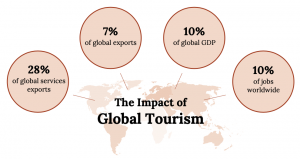
Positive impacts from this economic boom include robust foreign exchange, increases in income, and GDP growth. Tourism can also offer diverse employment opportunities, can be developed with local products, and is often compatible with other economic activities within a destination. Tourism often injects money into the community that leads to secondary economic development as well. For example, successful resorts may create the need for a commercial laundry facility or a pet boarding business.
However, there are also negative impacts. Property values may increase to the point of unaffordability for local residents, and the seasonality of the tourism industry may create a feast-or-famine economy. As with any economy, if too many resources are focused on just one industry, communities may be vulnerable to any unexpected economic, social, or environmental changes. One example is the New Jersey shore after the devastation of Hurricane Sandy in 2012. The tourism industry was severely impacted, leaving no economic fallback for local residents.
Social Impacts of Tourism
In addition to the economic benefits of tourism development, positive social impacts include an increase in amenities (e.g., parks, recreation facilities), investment in arts, culture, heritage and tradition, celebration of indigenous communities, and community pride. Tourism also has the potential to break down language, socio-cultural, religious, and political barriers. When developed conscientiously, tourism can, and does, contribute to a positive quality of life for residents and promotes a positive image of the destination.
However, as identified by the United Nations Environment Programme, negative social impacts of tourism can include: change or loss of indigenous identity and values; culture clashes; changes in family structure; conflict within the community for the tourism dollar; and ethical issues, including an increase in sex tourism, crime, gambling, and/or the exploitation of child workers. [5]
Environmental Impacts of Tourism
Tourism relies on, and greatly impacts, the natural environment in which it operates. In some destinations, there is a great appreciation of the environmental resources as the source of the tourism industry, and as such there are environmental protection policies and plans in place. Tourism has helped to save many delicate ecosystems and their flora and fauna. Preservation of these important resources benefits not only the tourist but also the local residents as well.
Even though many areas of the world are conserved in the form of parks and protected areas, tourism development can still have severe negative economic impacts. According to The United Nations Environment Programme, these can include the depletion of natural resources (water, forests, etc.), pollution (air pollution, noise, sewage, waste and littering), and physical impacts (construction activities, marina development, trampling, loss of biodiversity, and spread of disease). [6]
The environmental impacts of tourism can reach beyond local areas and have an effect on the global ecosystem. One example is increased air travel, which is often identified as a major contributor to climate change.
Whether positive or negative, tourism is a force for change around the world, and the industry is transforming at a staggering rate.
The Hospitality Industry
When looking at tourism it is important to consider the term hospitality. Some define hospitality as “the business of helping people to feel welcome and relaxed and to enjoy themselves.” [7] Simply put, the hospitality industry is the combination of the accommodation and food and beverage groupings, collectively making up the largest segment of the industry.

The pineapple has long been the symbol of hospitality. The Caribs, indigenous people of the Lower Antilles in the Caribbean, first used it as such a symbol. The Spaniards knew they were welcome if a pineapple was placed at the entrance to the village. This symbolism spread across Europe and North America where it became the custom to carve the shape of a pineapple into the columns at the entrance of the plantation. [8] Charles Carter added a three and a half foot wooden pineapple to the peak of the roof at Shirley Plantation, the first plantation in Virginia. [9] It is now common to see the image of the pineapple as a sign of welcome, warmth and hospitality.
The types of employees and resources required to run an accommodation business—whether it be a hotel, motel, or even a campground—are quite similar. All these businesses need staff to check in guests, provide housekeeping, employ maintenance workers, and provide a place for people to sleep. As such, they can be grouped together under the heading of accommodation and lodging . Figure 16.4 summarizes the various groupings within the industry.
Hotel Types
Hotels are typically referred to by hotel type or other classifications. Hotel type is determined primarily by how it will function and what amenities will be included within the property. Size, location, service levels and type of business or targeted market segments are additional classifications. Industry also classifies hotels by chain scale … separating hotels into categories determined by their average daily rates. Various ownership structures and brand affiliations also differentiate hotels.
Classifications
Hotels may be classified on a number of different variables. Type of Hotel : There are numerous classifications by hotel type including all-inclusive hotels, all-suite properties, B&B/Inns, boutique, convention/conference centers, condo hotels, resort, extended stay, full service, casino, limited service and timeshare properties. Size and Complexity: A hotel can be classified by the number of guest rooms it has; hotel sizes can range from a small boutique hotel with fewer than 50 rooms to a large resort hotel with more than 1,000 rooms. The complexity of the hotel is determined by the volume and number of additional revenue generating functions such as the square feet of available conference space, number of F&B operations and additional services and amenities like pools, fitness centers, spas, golf, etc. Location: The location of a hotel can also determine the type of guest served. An airport hotel may be very different from a city-center property in an urban environment, or a remote island resort or a small quaint bed and breakfast located on top of a mountain. Hotels that specialize in conferences, may locate near entertainment destinations like Las Vegas or Disney theme parks to provide pre-post conference activities for attendees. Service Level: The level of service provided is also a key variable, ranging from an inexpensive budget or economy hotel, (Limited or Focused Service Hotels) which may have limited services and amenities, to upscale and luxury hotels (Full Service Hotels) with many services and a wide range of amenities. Market Segmentation: Figure 16.5 on the next page outlines the characteristics of specific hotel types that have evolved to match the needs of a particular traveler segment. As illustrated, hotels adapt and diversify depending on the markets they desire and need to drive occupancy levels and generate revenues. Some hotels will specialize in a specific market segment, but in today’s competitive environment, most hotels will target a combination of these segments.
There are several other industry related organizations, such as Forbes and AAA which provide Consumer Ratings for individual hotels … another form of classifying a property. Forbes has traditionally awarded one to five “Stars” and AAA, one to five “Diamond” ratings. Additionally, many social media applications like Trip Advisor offer hotel property ratings to consumers.
Chain Scale: Smith Travel Research (STR) is an organization that provides the lodging industry with global data benchmarking, analytics and marketplace insights. STR classifies the lodging industry into six chain scale segments according to their respective brand Average Daily Rate (ADR). The six segments are defined as Luxury ; Upper Upscale ; Upscale ; Mid-Scale with F&B ( Upper Mid-Scale ); Mid-Scale without F&B ( Mid-Scale ) and Economy . Through STR’s 30—plus years of service to the hospitality industry—they have developed vital benchmarking performance solutions, established market trend transparency and provided data used by the investment community to support hotel development projects. Their core product, the STAR report, provides hotel owners and operators with comparative performance data between their property and a defined set of market competitors and allows you to follow trends in hotel occupancy, average daily rate (ADR) and revenue per available room (RevPar). Developers, investors, industry analysts, hotel brands and management companies all utilize STR data when determine what type of hotel to build and what location would provide maximum opportunity for success.

The type of ownership, brand affiliation and management are also very important variables in the classification of hotels. Owners may manage their own hotels independently but in today’s competitive environment, they would likely sign a Franchise Agreement with a nationally recognized brand as well as a Management Contract with a hotel management company to manage the property. A hotel chain such as Marriott, Hilton, Hyatt or IHG (Intercontinental Hotel Group) is comprised of multiple brands: Marriott, following their recent merger with Starwood currently has 30 different hotel brands, with each name representing a different level of price, service or targeted market segments.
Branding Decision
Selecting a brand affiliation is one of the most significant decisions hotel owners must make. [10] The brand affiliation selected will largely determine the cost of hotel development or conversion of an existing property to meet the standards of the new brand. The affiliation will also determine a number of things about the ongoing operation including the level of services and amenities offered, cost of operation, marketing opportunities or restrictions, and the competitive position in the marketplace. For these reasons, owners typically consider several branding options before choosing to operate independently or to adopt a brand affiliation.
Franchise Agreements
Another managerial and ownership structure is franchising. A hotel franchise enables individuals or investment companies (the franchisee) to build or purchase a hotel and then buy or lease a brand name to become part of a chain of hotels using the franchisor’s hotel brand, image, loyalty program, goodwill, procedures, cost controls, marketing, and reservations systems. [11]
A franchisee becomes part of a network of properties that use a central reservations system with access to electronic distribution channels, regional and national marketing programs, central purchasing, revenue management support, and brand operating standards. A franchisee also receives training, support, and advice from the franchisor and must adhere to regular inspections, audits, and reporting requirements.
Selecting a franchise structure may reduce investment risk by enabling the franchisee to associate with an established hotel company. Franchise fees can be substantial, and a franchisee must be willing to adhere to the contractual obligations with the franchisor. [12] Franchise fees typically include an initial fee paid with the franchise application and continuing fees paid during the term of the agreement. These fees are usually a percentage of revenue but can be set at a fixed fee. The total percentage of sales ranges significantly for hotels from 3.3–14.7 percent with a median of 11.8 percent. [13]

Management Contracts
It is common for ownership to utilize a management contract , which is a service offered by a management company to manage a hotel or resort for its owners. Owners have two main options for the structure of a management contract. One is to enter into a management agreement with an independent third-party hotel management company to manage the hotel. There are hundreds of these companies, but some of the large organizations include Aimbridge, Benchmark Hospitality, Crescent Hotels, Interstate Hotels, and White Lodging. A slightly different option is for owners to select a single company to provide both the brand and the expertise to manage the property. Marriott, Hilton, and Hyatt, are companies that provide this second option to owners.

Food and Beverage Services

The food and beverage sector is commonly known to industry professionals by its initials F&B. The F&B sector grew from simple origins to meet the basic needs for food and beverage services to increasing demand for unique experiences and broader options. As the interests of the public became more diverse, so too did the offerings of the F&B sector. The increasing awareness and demand for organic, sustainable, local or craft options as well as special dietary needs in food and beverage continue to challenge this industry. In addition, in order to better attract and serve a diverse array of diners, the F&B industry now consists of a variety of segments. The following is a discussion of each.
Quick-Service Restaurants
Formerly known as fast-food restaurants, examples of quick-service restaurants , or QSRs, include Chick-fil-A, Subway, and Pizza Hut. This prominent portion of the food sector generally caters to both residents and visitors, and it is represented in areas that are conveniently accessed by both. Brands, chains, and franchises dominate the QSR landscape. While the sector has made steps to move away from the traditional “fast-food” image and style of service, it is still dominated by both fast food and food fast; in other words, food that is purchased and prepared quickly, and generally consumed quickly as well.

Fast-Casual Restaurants
Fast-Casual restaurants focus on higher quality ingredients than QSR’s and provide made-to-order food in an environment that does not include table service. Customers usually queue and order at a counter. The seating area is more upscale and comfortable. Examples would include Chipotle Mexican Grill, Panera and Jason’s Deli.

Full-Service Restaurants
Full-service restaurants are perhaps the most fluid of the F&B operation types, adjusting and changing to the demands of the marketplace. Consumer expectations are higher here than with QSRs. [14] The menus offered are varied, but in general reflect the image of the restaurant or consumer’s desired experience. Major segments include fine dining, family/casual, ethnic, and upscale casual. Fine dining restaurants are characterized by highly trained chefs preparing complex food items, exquisitely presented. Meals are brought to the table by experienced servers with sound food and beverage knowledge in an upscale atmosphere with table linens, fine china, crystal stemware, and silver-plate cutlery. The table is often embellished with fresh flowers and candles. In these businesses, the average check, which is the total sales divided by number of guests served, is quite high (often reviewed with the cost symbols of three or four dollar signs: $$$ or $$$$.) Examples include the Inn at Little Washington, Ruth’s Chris Steakhouse and Capitol Grille.
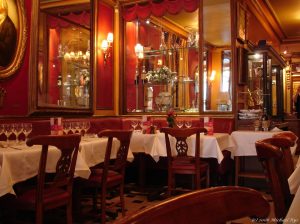
Casual restaurants serve moderately-priced to upscale food in a more casual atmosphere. Casual dining comprises a market segment between fast casual establishments and fine dining restaurants. Casual dining restaurants often have a full bar with separate bar staff, a larger beer menu and a limited wine menu. This segment is full of chains such as Chili’s, Outback, Red Robin and Cracker Barrel as well as many independent restaurants in regional or local markets.
Family restaurants offer affordable menu items that span a variety of customer tastes. They also have the operational flexibility in menu and restaurant layout to welcome large groups of diners. An analysis of menus in family/casual restaurants reveals a high degree of operational techniques such as menu item cross-utilization, where a few key ingredients are repurposed in several ways. Both chain and independent restaurant operators flourish in this sector. Examples of chains in this category would be Golden Corral, Cici’s Pizza and Ponderosa Steakhouse.
Ethnic restaurants typically reflect the owner’s cultural identity, Vietnamese, Cuban, Thai, etc. The growth and changing nature of this sector reflects the acceptance of various ethnic foods within our communities. Ethnic restaurants generally evolve along two routes: toward remaining authentic to the cuisine of the country of origin or toward larger market acceptance through modifying menu items. [15] Examples would be P.F. Chang’s, Tara Thai or Pei Wei.
Bars, Wineries, and Craft Distilling
The beverage industry continues to evolve as well with a strong focus on local craft beers, wines, cider and distilling. Wineries exist in almost every state, with over 250 in Virginia as of 2015. [16] Wine, bourbon, cider trails and brew pub crawls, etc. are used to generate awareness and create experiences for customers. Wineries often use event space or festivals to take advantage of the beauty of the winery and supplement their revenues.
Institutional Food Service
Institutional f ood s ervice is large scale and often connected to governmental (National Parks) or corporate level organizations. Often run under a predetermined contract, the institutional F&B sector includes:
- Educational institutions
- Prisons and other detention facilities
- Corporate staff cafeterias
- National Park restaurants and concessions
- Cruise ships
- Airports and other transportation terminals and operations
Examples of companies who focus on Institutional Food Service are Compass, Sodexho, Aramark.
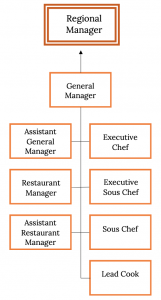
Accommodation Food Service
This sector includes hotel restaurants and bars, room service, and self-serve dining operations (such as a breakfast room). Hotel restaurants are usually open to the public and reliant on this public patronage in addition to business from hotel guests. Collaborations between hotel and restaurant chains have seen reliable pairings such as the combination of Shula’s Steakhouse and Marriott Hotels.
Restaurant Industry Profitability and Cost Control
According to the National Restaurant Association, QSRs have the highest pre-tax profit margin at 6.3 percent, while full-service restaurants have a margin of 4.7 percent. There will be significant variances from these percentages at individual locations, even within the same brand. [17]
A number of costs influence the profitability of an F&B operation. Some of the key operating expenses (as a percentage of revenue) are detailed in Figure 16.16, above, where food cost and salaries & wages are the two major expenses, each accounting for approximately a third of the total. Other expenses include rental and leasing of venue, utilities, advertising, and depreciation of assets. These percentages represent averages, and will vary greatly by sector and location.
Cost control and containment is essential for all F&B businesses. Demanding particular attention are the labor, food, and beverage costs, also known as the operator’s primary costs. In addition to these big ticket items, there is the cost of reusable operating supplies such as cutlery, glassware, china, and linen in full-service restaurants.
Recreation can be defined as the pursuit of leisure activities during one’s spare time [19] and can include vastly different activities such as golfing, sport fishing, and rock climbing. Defining recreation as it pertains to tourism, however, is more challenging.
Let’s start by exploring some recreation-based terms that are common in the tourism industry. Outdoor recreation can be defined as “outdoor activities that take place in a natural setting, as opposed to a highly cultivated or managed landscape such as a playing field or golf course.” [20] This term is typically applied to outdoor activities in which individuals engage close to their community. When these activities are further away, and people must travel some distance to participate in them, they are often described as “adventure tourism”. According to the United Nations World Tourism Organization (UNWTO), adventure tourism is “a trip that includes at least two of the following three elements: physical activity, natural environment, and cultural immersion.” [21]
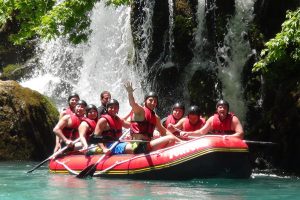
Ultimately, categorization is based on a combination of several factors, including manner of engagement in the activity (risk exposure, experience requirement, group or solo activity), the distance travelled to access the activity, and the type of environment (proximity to nature, level of challenge involved) in which the activity occurs.
A 2013 adventure tourism market study discovered that people who travel for adventure experiences tend to be well-educated, with 48 percent holding a four-year degree or higher credential. They value natural beauty and rank this factor highest when choosing a destination. The most cited reasons for their travel are “relaxation, exploring new places, time with family, and learning about different cultures.” [22]
Globally, it is estimated that the continents of Europe, North America, and South America account for 70 percent of adventure tourism, or US$263 billion in adventure travel spending. [23]
Entertainment
Entertainment is a very broad category which overlaps with many of the areas discussed elsewhere in this chapter, like hotels and accommodation. Two major types of entertainment that we’ll discuss here are gaming and theme parks.
Gaming has grown significantly in the United States and globally. The number of casinos in the United States has been growing since 2010, and in 2013, there were over 500 commercial casinos, as shown in Figure 16.16. Casinos are found all over the United States in major cities, riverboats, and on Native American lands. However, US casino revenue has been relatively flat, while global gaming revenues have been on the increase, largely due to Asian market growth. Most casinos involve other facets of the Hospitality industry such as lodging, F&B, golf, entertainment, spas, etc., but they also have the added challenges of casino operations.
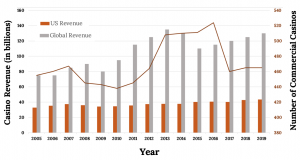
Theme Parks
Theme parks have a long history dating back to the 1500’s in Europe, and have evolved ever since. Today, it is hard not to compare any amusement park destination to Disneyland and Disney World. Opened in 1955 in sunny California, Disneyland set the standard for theme parks. Theme parks outside of California and Florida are often highly seasonable operations challenged with significant staffing and training requirements each year.

Convention and Event Management
A convention is a large meeting of people with similar interests who meet for a period of at least a few days to discuss their field. An event is a gathering at a given place and time, usually of some importance, often celebrating or commemorating a special occasion.
Both conventions and events can be extremely complex projects, which is why, over time, the role of meeting planners has taken on greater importance. The development of education, training programs, and professional designations such as CMPs (Certified Meeting Planners), CSEP (Certified Special Events Professional), and CMM (Certificate in Meeting Management) has led to increased credibility in this business and demonstrates the importance of the sector to the economy.
Meeting planners may be independent contractors hired to facilitate the planning process, work directly for the company full time to coordinate their meeting, or work for hotels, conference centers and event venues directly.
- The various tasks involved in meeting and event planning include:
- Conceptualizing/theming
- Site inspection & selection
- Logistics and planning
- Human resource management
- Marketing and public relations
- Budgeting and financial management
- Sponsorship procurement
- Management and evaluation
Event Categories
Mega-events.
A m ega-event is a large scale, highly prestigious event such as the Olympic Games, the FIFA World Cup, or a global economic summit. These events typically gain tremendous media coverage and have major economic impacts on the host location, both positive and negative. High levels of tourism (1 million visitors) associated with a mega-event brings revenue, but the revenue may be outweighed by substantial capital and social costs incurred by the host. The events are often awarded to host destinations through a bidding process and gain tremendous media coverage.

Special Events
A special event is a one-time or infrequent specific ritual, presentation, performance, or celebration. Special events are planned and created to mark a special occasion, such as a presidential inauguration or the Queen of England’s 90 th birthday. Like mega-events, there may be significant media coverage and economic impact for the host city or destination.
Hallmark Events
A hallmark event is a unique event that is often identified with the location where it is held, like Carnival in Rio de Janeiro or Oktoberfest in Munich. Hallmark events contribute significant economic benefits and even can create a competitive advantage for the host city or destination that attracts tourists.

A festival is a themed public celebration that conveys, through a kaleidoscope of activities, certain meaning to participants and spectators. Festivals are often celebrations of community or culture and feature music, dance, or dramatic performances. Examples include Lollapalooza, the Cannes Film Festival, and Junkanoo in the Bahamas.
Local Community Events
A local community event is generated by and for locals; although it may attract tourists, its main audience is the local community. The community may experience measurable economic impacts, as might happen at The Steppin’ Out Street Fair in Blacksburg (think hotel stays and eating out). Fundraisers and community picnics are also examples in this category.
Meetings and Conventions
The tourism industry also has a long history of creating, hosting, and promoting meetings and conventions that draw business travelers. In fact, Convention and Visitor Bureau’s (CVB’s) work hard to attract these meetings and conventions to their city to drive economic benefit for hotels, restaurants, entertainment venues, etc.
There are several types of such events
Conventions generally have very large attendance, and are held on a regular schedule but in different locations. They also often require a bidding process. Political conventions are one such example.
Association M eetings or C onferences are held regionally and nationally for hundreds of associations or events focused on specific themes. Examples would be the National Restaurant Association Annual Convention, ComicCon, or the National Auto Show.
Corporate M eetings will vary significantly in size and purpose and include regional or national sales meetings, shareholder meetings, training sessions, or celebrations. The location will vary depending on the nature of the meeting. They may be held at an airport property, a traditional corporate meeting facility or even an upscale resort.
Trade S hows and T rade F airs can be stand-alone events, or adjoin a convention or conference.
S eminars , W orkshops , and R etreats are examples of smaller-scale events.
As meeting planners have become more creative, meeting and convention delegates have been more demanding about meeting sites. No longer are hotel meeting rooms and convention centers the only type of location used; non-traditional venues have adapted and become competitive in offering services for meeting planners. These include architectural spaces such as airplane hangars, warehouses, or rooftops and experiential venues such as aquariums, museums, and galleries. [24]
Transportation and travel services are another large element of the tourism industry. This area includes cruise ships, airlines, rail, car rentals, and even ride sharing such as Uber and Lyft. Each of these segments is impacted significantly by fuel costs, safety issues, load factors and government regulation.
If you’ve ever been on a cruise, you are in good company. According to CLIA (Cruise Lines International Association), 23 million passengers were expected to go on a cruise worldwide on 62 member lines in 2015. [25] The industry employs over 900,000 people. [26]
Over 55 percent of the world’s cruise passengers are from North America, and the leading destinations (based on ship deployments), according to CLIA are: [27]
- The Caribbean (36 percent)
- The Mediterranean (20 percent)
- Northern Europe (11 percent)
- Australia/New Zealand (6 percent)
- Alaska (6 percent)
- Asia (5 percent)
- South America (3 percent)

The t ravel services sector is made up of a complex web of relationships between a variety of suppliers, tourism products, destination marketing organizations, tour operators, and travel agents, among many others. Under the North American Industry Classification System (NAICS), the travel services industry group includes “establishments primarily engaged in travel arrangement and reservation services. Examples … are tourist and travel agencies; travel tour operators and wholesale operators; convention and visitors’ bureaus; airline, bus, railroad and steamship ticket offices; sports and theatrical ticket offices; and airline, hotel and restaurant reservation offices.” [28] Tourism services support industry development and the delivery of guest experiences.
Travel Agencies
A travel agency is a business that operates as the intermediary between the travel industry (supplier) and the traveler (purchaser). Part of the role of the travel agency is to market prepackaged travel tours and holidays to potential travelers. The agency can further function as a broker between the traveler and hotels, car rentals, and tour companies. [29] Travel agencies can be small and privately owned or part of a larger entity.
Online Travel Agencies (OTAs)
Online travel agents (OTAs) are companies that aggregate accommodations and transportation options and allow users to choose one or many components of their trip based on price or other incentives. Examples of OTAs include Booking.com, Expedia.com, Hotwire.com, and Kayak.com. OTAs are gaining popularity with the travelling public; in 2012, they reported online sales of almost $100 billion [30] and almost triple that figure, upward of $278 billion, in 2013. [31] Over 40 percent of US travelers booked flights online in 2014. [32]
Tour Operators
A tour operator packages all or most of the components of an offered trip and then sells them to the traveler. These packages can also be sold through retail outlets or travel agencies. [33] Tour operators work closely with hotels, transportation providers, and attractions in order to purchase large volumes of each component and package these at a better rate than the traveler could by purchasing individually.
Destination Marketing Organizations (DMOs)
Destination marketing organizations (DMOs) include national tourism boards, state/provincial tourism offices, and community convention and visitor bureaus around the world. DMOs promote “the long-term development and marketing of a destination, focusing on convention sales, tourism marketing and service” [34] .
Country Clubs
Country c lubs are another part of the Hospitality industry with a very different service strategy focusing on serving members who will develop relationships with the staff compared to a more transactional service interaction in lodging, restaurants or airlines.
Country clubs do not focus as strongly on profit as they do on maximizing member satisfaction, retention and growth while maintaining an attractive fee structure. Country (or city) clubs, will typically have restaurant and bar operations, catered events and other amenities such as golf, tennis, pool, fitness facilities, etc. Depending on the type of club, family and youth events are important to maintain and grow membership.
Strong customer service, culinary, event management and general management skills are necessary to be successful in clubs.

Chapter Video
As in any other fast-moving industry, the landscape in Hospitality and Tourism is always changing. This video explores 10 of the more important current trends impacting the industry.
(Copyrighted material)
Key Takeaways
- The Tourism industry is the largest industry in the world with significant benefit and costs to a region. The global competition for the tourism dollar is significant within the US and between countries.
- Hotels vary significantly in size, quality, purpose, chain affiliation, and ownership. The complexity of the operation and leadership vary as well.
- Food and Beverage is made up of a wide variety of restaurant types from QSR, Fast Casual, Fine Dining and Ethnic. Institutional food service in business , hospitals, education, parks and concessions are a significant part of the Food and Beverage industry.
- The evolution of tastes and consumer expectations in food and beverage continue to provide opportunity and challenges in the industry for ethnic sustainable, organic, local, craft, and other unique experiences.
Portions of this chapter were adapted from Westcott, Morgan (Ed) Introduction to Tourism and Hospitality in BC. CC BY 4.0 https://opentextbc.ca/introtourism . Available for free at: http://open.bccampus.ca
Image Credits: Chapter 16
Figure 16.1: Siebe Warmoeskerken (2018). Unsplash. Public Domain. Retrieved from: https://unsplash.com/photos/mxNrtFzOd-I
Figure 16.2: Data retrieved from: https://wttc.org/Research/Economic-Impact ; World map retrieved from: Max Naylor (2006). “BlankMap-World-Continents-Coloured.” Wikimedia Commons. CC BY-SA 3.0 . Retrieved from: https://commons.wikimedia.org/wiki/File:BlankMap-World-Continents-Coloured.PNG
Figure 16.3: Rodhullandemu (2012). “The Pineapple Hotel, Park Road, Liverpool.” CC BY-SA 3.0 . Retrieved from: https://commons.wikimedia.org/wiki/File:Pineapple,_Park_Road,_Liverpool.jpg
Figure 16.6: Stephen J. Skripak. “Example of a Hotel Market Segmentation by STR’s Chain Scale.” CC BY 4.0 .
Figure 16.7: Christina Hsu (2009). “San Diego City and Bay at Night.” Flickr. CC BY-NC-SA 2.0 . Retrieved from: https://flic.kr/p/6KZ5Cv
Figure 16.8: Anastasia Cortes (2016). “The Inn at Virginia Tech.” Public Domain. Provided by the author.
Figure 16.9: Dale Cruse (2014). “New Zealand langoustines at Troquet.” Flickr. CC BY-NC-SA 2.0 . Retrieved from: https://www.flickr.com/photos/dalecruse/8551895022/
Figure 16.10: Imzadi1979 (2012). “An Axample of a Typical American Logo Sign.” Wikipedia. Public Domain. Retrieved from: https://en.wikipedia.org/wiki/Logo_sign#/media/File:Logo_Sign.svg
Figure 16.11: Mike Mozart (2014). “Panera Bread.” Wikimedia Commons. CC BY-SA 2.0 . Retrieved from: https://commons.wikimedia.org/wiki/File:Panera_Bread_(13883443466).jpg
Figure 16.12: Michael Rys. “Le Procope.” Wikimedia Commons. CC BY-NC-SA 2.0 . Retrieved from: https://commons.wikimedia.org/wiki/File:Inside_Le_Procope.jpg#mw-jump-to-license
Figure 16.13: Stephen J. Skripak. “The Restaurant Industry Career Path.” CC BY 4.0 .
Figure 16.14: Table adapted from National Restaurant Association (2014). 2013 -2014 Restaurant Operations Report .
Figure 16.15: JohnSM (2013). “Rafting in Turkey.” Pixabay. Public domain. Retrieved from: https://pixabay.com/en/raftingturkey-travel-1125213/
Figure 16.16: UNLV Center for Gaming Research. “US and Global Casino Revenues (2005-2019).” (2005-2015) Data Retrieved from: https://gaming.unlv.edu/reports/national_annual_revenues.pdf ; (2016) Data Retrieved from: https://web.archive.org/web/20170301070205/http://gaming.unlv.edu/reports/national_monthly.pdf ; 2017 Data Retrieved from: https://www.americangaming.org/resources/state-of-the-states-2018-the-aga-survey-of-the-commercial-casino-industry/ ; 2018 Data Retrieved from: https://web.archive.org/web/20190201140714/https://gaming.unlv.edu/reports/national_monthly.pdf ; 2019 Data Retrieved from: https://abcnews.go.com/Entertainment/wireStory/us-commercial-casinos-won-436-billion-2019-37-71069042; Global Revenue Data Retrieved from: https://www.statista.com/statistics/271577/global-casino-gaming-market-revenue/ ; Number of Commercial Casinos Data Retrieved from: https://www.statista.com/statistics/187972/number-of-us-commercial-casinos-since-2005/
Figure 16.17: Josh Hallett (2009). “The ‘Big Bang’ at Wishes – Magic Kingdom – Walt Disney World.” Flickr. CC BY-NC-SA 2.0 . Retrieved from: https://www.flickr.com/photos/hyku/3830182777
Figure 16.18: Peter23 (2011). “Beijing National Stadium.” Wikimedia Commons. CC BY-SA 3.0 . Retrieved from: https://commons.wikimedia.org/wiki/File:Beijing_national_stadium.jpg
Figure 16.19: Skeeze (2014). “Mardi Gras in New Orleans.” Pixabay. Public domain. Retrieved from: https://pixabay.com/photos/mardi-gras-new-orleans-festival-1176483/
Figure 16.20: Peter Hansen (2017). “Cruise Ship Photo.” Unsplash. Public Domain. Retrieved from: https://unsplash.com/photos/MeGmdPNe36w
Figure 16.21: Dan Perry (2006). “Riviera Country Club in Pacific Palisades, California.” Wikimedia Commons. CC BY-NC-SA 2.0 . Retrieved from: https://commons.wikimedia.org/wiki/File:Riviera_Country_Club,_Golf_Course_in_Pacific_Palisades,_California_(168828797).jpg
Video Credits: Chapter 16
Sisyanti, Ling Ling, Wasim Amsal, Ella Qiu, and Rebecca Catherine Stephany (2015, February 6). “10 trends in Hospitality and Tourism Industry.” YouTube. Retrieved from: https://www.youtube.com/watch?v=SJ8Momwv7Qk
- World Tourism Organization UNWTO (2015). “Why Tourism?” Retrieved from: http://www2.unwto.org/content/why-tourism ↵
- United Nations Statistics Division (2010, December). “Tourism as an Internationally Traded Service and Beyond.” Newsletter of the Interagency Task Force on Statistics of International Trade in Services. No. 6. p. 1. Retrieved from: http://unstats.un.org/unsd/tradeserv/tfsits/newsletter/TFSITS_newsletter_6.pdf ↵
- World Tourism Organization UNWTO (2015). “Exports from International Tourism Rise 4% in 2015.” Retrieved from: http://media.unwto.org/press-release/2016-05-03/exports-international-tourism-rise-4-2015 ↵
- Association of Bhutanese Tour Operators (2010). “UNWTO Tourism Vision 2020 Forecast Released.” Retrieved from: http://www.abto.org.bt/2010/06/unwto-tourism-2020-vision-forecast-released/ ↵
- United Nations Environment Programme (2016). “Negative Socio-Cultural Impacts from Tourism.” Retrieved from: http://www.unep.org/resourceefficiency/Business/SectoralActivities/Tourism/FactsandFiguresaboutTourism/ImpactsofTourism/Socio-CulturalImpacts/NegativeSocio-CulturalImpactsFromTourism/tabid/78781/Default.aspx ↵
- United Nations Environment Programme (2016). “Tourism’s Three Main Impact Areas.” Retrieved from: http://www.unep.org/resourceefficiency/Business/SectoralActivities/Tourism/TheTourismandEnvironmentProgramme/FactsandFiguresaboutTourism/ImpactsofTourism/EnvironmentalImpacts/TourismsThreeMainImpactAreas/tabid/78776/Default.aspx ↵
- Discover Hospitality (2015). “What is Hospitality?” Retrieved from: https://web.archive.org/web/20150814071021/http://discoverhospitality.com.au/what-is-hospitality ↵
- L. P. Coyle (1982). “Pineapple” in World Encyclopedia of Food . New York: Facts on File. p. 517. ↵
- Colonial Williamsburg Foundation (2016). “The Pineapple in Colonial Williamsburg.” Retrieved from: http://www.history.org/almanack/life/christmas/dec_pineapple.cfm ↵
- C. Crandell, K. Dickinson, and G. I. Kanter (2004). "Negotiating the hotel management contract" In Hotel Asset Management: Principles & Practices . East Lansing, MI: University of Denver and American Hotel & Lodging Educational Institute. ↵
- S. Rushmore (2005). “What Does a Hotel Franchise Cost?” Canadian Lodging Outlook. Retrieved from: www.hotel-online.com/News/PR2005_4th/Oct05_FranchiseCost.html ↵
- Ibid.; N. Migdal (n.d.). “Franchise Agreements vs. Management Agreements: Which One Do I Choose?” Hotel Business Review. Retrieved from: hotelexecutive.com/business_review/2101/test-franchise-agreements-vs-management-agreements-which-one-do-i-choose ↵
- Stephen Rushmore Jr., Erin S. Bagley (2014). “2014 United States Hotel Franchise Fee Guide.” HVS. Retrieved from: http://www.hvs.com/article/7097/2014-united-states-hotel-franchise-fee-guide/ ↵
- H. G. Parsa, K. R. Lord, S. Putrevu, and J. Kreeger (2015). “Corporate Social and Environmental Responsibility in Services; Will Consumers Pay for It?” Journal of Retailing and Consumer Services. Vol. 22. pp. 250-260. ↵
- A. H. Mak, M. Lumbers, A. Eves, and R. C. Change (2012). “Factors Influencing Tourist Food Consumption.” International Journal of Hospitality Management. Vol. 31. No. 3. pp. 928-936. ↵
- Virginia Wine Association (2016). “Virginia Wineries.” Virginia Wines. Retrieved from: https://www.virginiawine.org/wineries/ ↵
- American Restaurant Association and Deloitte Development LLC (2013). 2013-2014 Restaurant Operations Report . Washington, D.C.: National Restaurant Association. p. 7. ↵
- Table adapted from National Restaurant Association (2014). 2013-2014 Restaurant Operations Report . Washington, D.C.: National Restaurant Association. ↵
- J. Tribe (2011). The Economics of Recreation, Leisure, and Tourism , 4th ed. Oxford, England: Elsevier. ↵
- Tourism BC (2013). “2009/2010 Outdoor Recreation Study.” Destination British Columbia. Retrieved from: http://www.destinationbc.ca/getattachment/Research/Research-by-Activity/All-Research-by-Activity/Outdoor-Recreation-Study-2009-2010,-January-2013/Outdoor-Recreation-for-Distribution-14Jan13-FINAL-DRAFT-(2).pdf.aspx ↵
- United Nations World Tourism Organization (2014). Global Report on Adventure Tourism . UNWTO and the Adventure Tourism Trade Association. p. 12. Retrieved from: http://cf.cdn.unwto.org/sites/all/files/pdf/final_1global_report_on_adventure_tourism.pdf ↵
- Ibid., p. 15. ↵
- George Washington University (2013). “Adventure Tourism Market Study 2013.” The Adventure Travel Trade Association. p. 2. Retrieved from: http://files.adventuretravel.biz/docs/research/adventure-tourism-market-study-2013-web.pdf ↵
- K. Colston (2014, April 24). "Non-Traditional Event Venues – Endless Entertainment." Retrieved from: http://helloendless.com/non-traditional-event-venues/ ↵
- CLIA (2016). CLIA 2015 Annual Report: One Voice: Advancing Our Industry Together . Cruise Lines International Association. p. 10. Retrieved from: http://www.cruising.org/docs/default-source/market-research/clia_2015_annualreport_web.pdf?sfvrsn=0 ↵
- Ibid. ↵
- CLIA (2015). CLIA 2015 Cruise Industry Outlook: Cruising to New Horizons and Offering Travelers More . Cruise Lines International Association. p. 28. Retrieved from: http://www.cruising.org/docs/default-source/research/2015-cruise-industry-outlook.pdf ↵
- Government of Canada (2014). “NAICS 2007: 5615 Travel Arrangement and Reservation Services.” Statistics Canada. Retrieved from: http://stds.statcan.gc.ca/naics-scian/2007/cs-rc-eng.asp?criteria=5615 ↵
- C. Goeldner and B. Ritchie (2003). Tourism: Principles, Practices, Philosophies , 9th ed. Hoboken, New Jersey: John Wiley & Sons, Inc. ↵
- R. Carey, K. Kang, and M. Zea (2012). "The Trouble With Travel Distribution." McKinsey & Company. Retrieved from: www.mckinsey.com/insights/travel_transportation/the_trouble_with_travel_distribution ↵
- The Economist (2014). “Sun, Sea and Surfing: The Market for Booking Travel Online Is Rapidly Consolidating.” Economist. Retrieved from http://www.economist.com/news/business/21604598-market-booking-travel-online-rapidly-consolidating-sun-sea-and-surfing ↵
- The Trefis Team (2015). “An Update on the Online Travel Agencies.” Forbes. Retrieved from: http://www.forbes.com/sites/greatspeculations/2015/09/30/an-update-on-the-online-travel-agencies/#60c1ed4d3e0b ↵
- The Destination Marketing Association International (2014). “The value of DMOs.” Retrieved from: http://www.destinationmarketing.org/value-dmos ↵
Chapter 16 Hospitality and Tourism Copyright © 2020 by Stephen J. Skripak and Ron Poff is licensed under a Creative Commons Attribution 4.0 International License , except where otherwise noted.
Share This Book
What to Know About Hospitality and Tourism Management Degree Programs
Hospitality management degrees are designed to train future leaders in the hospitality industry.
How to Study Hospitality Management

Getty Images
Running a company in any segment of the hospitality industry requires not only financial and marketing prowess, but also an understanding of how to create an inviting environment for guests.
The art and science of hosting strangers is an essential skill for people working in many kinds of businesses, including airlines, casinos, cruise ships, festivals, hotels and restaurants.
Running a company in any segment of the hospitality industry requires not only financial and marketing prowess, but also an understanding of how to create an inviting environment for guests. Cultivating that marketable skill set is the goal of associate, bachelor's and graduate programs in hospitality management.
What a Hospitality Management Degree Is and What Classes It Requires
The goal of any course of study in hospitality management is to train people to create and maintain spaces where others will immediately feel at home.
“Understanding how to take care of the customer is a foundational aspect of the hospitality discipline,” Angela Ramsey, senior director of communication at the University of Nevada—Las Vegas William F. Harrah College of Hospitality, explained in an email.
Hospitality management degrees are, foremost, degrees in business, says Michael Sabitoni, chair of the food and beverage management department and the international travel and tourism studies department at Johnson & Wales University in Rhode Island. They include classes in accounting, finance, human resources, law and technology, he says.
However, unlike a general business degree, a hospitality degree typically includes specialized coursework focusing on the hospitality industry, such as classes on food service business operations, event management principles, and hotel and resort leadership, Sabitoni says. An overview class about tourism is also typically included in hospitality management programs, and industry internships are often mandatory, he adds.
Many hospitality degree programs require students to participate in experiential learning by helping to operate a student-run hotel or restaurant. They may also contain classes on:
- Eco-tourism or sustainable travel
- Global tourism and special considerations involved with international trips
- Customer service protocols
- Assessing the quality of guest experiences
- Specific types of hospitality establishments, such as country clubs, golf courses, resorts, stadiums, timeshares or theme parks
- Nuances involved in planning certain kinds of events, such as conventions or weddings
- Concerns that face certain demographics of customers, including women and people of color
- Various types of tourism, including business trips and visits to cultural destinations or historical sites
Top Undergraduate Schools With Hospitality Management Majors
Many U.S. colleges and universities allow undergraduates to major in hospitality management, including multiple nationally renowned academic institutions. Cornell University of New York, an Ivy League college, has a school devoted to hospitality.
Exceptional hospitality programs are often based in major metropolitan areas that attract significant tourism. For example, New York University and Boston University in Massachusetts offer a hospitality management degree.
How to Know if a Hospitality Management Degree Is Right for You
An interest in the food and beverage sector, a love for travel or an interest in entertaining people may lead someone to consider pursuing a degree in hospitality management. But prospective students should be aware that the hospitality sector has leadership roles for people with all kinds of interests and personalities.
Though some managerial positions in the hospitality industry are customer-facing jobs that require significant people skills, there are also back-of-the-house managerial jobs that concentrate on logistics, Sabitoni says.
Significant cultural awareness and strong communication abilities are essential in hospitality. Foreign language skills are also valuable but not mandatory, Sabitoni says.
What You Can Do With a Hospitality Management Degree
Hospitality programs are designed to train future leaders in the sector.
“It can include anything within the hospitality vertical, from hotel investment companies to real estate firms to our big brands which are the Marriotts, the Hiltons, the Four Seasons, to data analytics companies to Googles to Amazons,” says Kate Walsh, dean of the Peter and Stephanie Nolan School of Hotel Administration at Cornell. “Anything that touches hospitality as a part of their business product is something where our students get involved.”
Real estate investment firms often invest in hotel buildings, so people with degrees in hospitality management sometimes find jobs in the real estate sector, Walsh says. Alumni of hospitality management programs sometimes become management consultants who concentrate on assisting companies in the hospitality industry, she adds.
Executive and director roles in the industry typically require at least a bachelor's degree. Many high-level leadership positions at U.S. hospitality firms pay annual salaries above $70,000, according to an article published by Monster.com, a job website.
In 2020, graduates of Cornell's Nolan School had an average base salary of slightly over $69,000 and an average bonus of nearly $15,000, according to the school's employment report .
Considerations for Potential Hospitality Students
Aspiring hospitality managers should be aware of trends that may affect them when they enter the industry, experts say.
This sector has severe labor shortages at hotels and restaurants, many of which laid off workers due to pandemic-related safety measures and now have struggled to replace those workers even after raising wages.
Because of these staffing concerns, many hospitality companies have introduced initiatives to recruit and retain talented staff, improve working conditions, increase job satisfaction and reduce employee turnover, Walsh says.
When comparing hospitality programs, prospective students should investigate whether those programs include experiential learning opportunities, experts say, noting that hands-on projects are one of the best ways to gain hospitality skills. It’s also optimal if hospitality schools offer courses on design, which can inform aesthetic choices about how a hospitality venue looks, according to experts.
“I think the industry needs innovative thinkers," Walsh says. "They need people who think big culturally, who are comfortable with different modes of work, so it’s a great time to join the industry. The industry is trying to be extremely intentional in providing compelling career paths.”
Searching for a grad school? Get our complete rankings of Best Graduate Schools.
Grad Degree Jobs With $100K+ Salaries

Tags: Travel , food and drink , education , students , graduate schools , colleges
You May Also Like
Get accepted to multiple top b-schools.
Anayat Durrani May 16, 2024

Premeds and Emerging Medical Research
Zach Grimmett May 14, 2024

How to Get a Perfect Score on the LSAT
Gabriel Kuris May 13, 2024

Premeds Take 5 Public Health Courses
Rachel Rizal May 7, 2024

Fortune 500 CEOs With a Law Degree
Cole Claybourn May 7, 2024

Why It's Hard to Get Into Med School
A.R. Cabral May 6, 2024

Pros, Cons of Unaccredited Law Schools
Gabriel Kuris May 6, 2024

An MBA and Management Consulting
Sammy Allen May 2, 2024

Med School Access for Minority Students
Cole Claybourn May 2, 2024

Different jobs with med degree
Jarek Rutz April 30, 2024


- German Soccer Sensation Finds a Home with the Bobcats
- From Air Force Veteran to the Middle of the Atlantic
- Career Assistance 44 Years After Graduation
- Admissions by Day. Filmmaking by Night.
- Admissions Process
- Alumni Updates
- Bryant & Stratton College News
- Business Degrees
- Career Services
- College Life
- Continuing Education
- Criminal Justice Studies
- Degree Insights
- Education Programs
- Financial Aid
- Healthcare Degrees
- Human Resources
- Military Relations
- Online Education
- Social Media
- Student Services
- Technology & Design
- Video Posts

Tourism vs. Hospitality - Decoding the Differences
Bryant & Stratton College Blog Staff

The hospitality and tourism industries are closely connected, but they are not the same thing. Though both connect to travel and leisure, these two industries have distinct differences that need to be understood if you are considering a degree or career in the field. By knowing how they are different, you can choose the right degree that will help you achieve your desired career path.
What is the Difference Between Tourism and Hospitality?
Hospitality is a field that focuses on providing accommodations to visitors at hospitality-related industries, such as hotels, motels, restaurants, cruise ships, country clubs, casinos, and convention centers, while tourism is focused on providing quality attractions and events in order to entice tourists to come.
For each of these fields to be successful, they focus on specific ways to keep people satisfied so they will return. Hospitality businesses must build strong relationships with their guests to not only prevent them from going to a competitor, but to keep them coming back. Many tourism businesses are classified as hospitality businesses as they must also have meaningful relationships, but they are more focused on traveling activities that may include heavy planning and marketing.
What are the Similarities Between Tourism and Hospitality?
Both the hospitality and tourism industries focus on serving people when they travel. These are highly competitive and always-changing fields that require people to be able to adapt to a changing market and work environment. Both tourism and hospitality professionals need to be good marketers to draw potential clients and customers to their industries.
What Jobs are there in the Travel and Tourism Industry?
The travel and tourism industry focuses on helping people plan and execute their travel arrangements. Some jobs in tourism management include:
Travel Agent
A travel agent is a great career path for people who majored in tourism. Travel agents work with their clients to plan their trips, so they must be highly organized and have a knowledge of the travel industry so they can book resorts, cruise ships, airline travel, and more for their clients.
Travel agents also assist clients with their travel budgets by calculating travel costs and helping clients choose trips and adventures that fit within their budget. They also can assist clients with getting their passports or other paperwork in order so they can legally travel.
The pay for a travel agent varies because they often earn commissions based on the trips and services they book, as well as the setting they work in. Travel agents can work independently or work with a travel agency, depending on the demand in their area.
Flight Attendant
A flight attendant works in an airline to help travelers get to their destination safely and comfortably. While travelers often see the simple work of the flight attendant, such as passing out snacks and collecting garbage, flight attendants are also trained on how to help protect passenger safety if something goes wrong.
Flight attendants need to be good at working with people, even those who are not in a good mood or who face frustration when they travel. One of the main benefits of this profession is getting to travel to and explore many destinations around the world.
The Bureau of Labor Statistics estimates that the demand for flight attendants will increase by 17% from 2019 to 2029, so it is a great time to pursue this career path.
What Jobs Are There in the Hospitality Industry?
Jobs within hotels, restaurants, and event centers tend to fall in the hospitality industry category. Hotel managers, event managers, hotel clerks, bar managers, and chefs are just a few examples in this industry, with details as follows:
Hotel Manager
A hotel manager makes sure that guests are comfortable during their stay in a hotel or resort. They may have to arrange for blankets or other amenities to be taken to hotel rooms, oversee the employees of the hotel, and ensure that supplies, like soap and shampoo, are ordered in a timely manner. On a resort property, the hotel manager may also be in charge of entertainment. The exact setting or location will dictate exact duties and responsibilities for this role. Overall, it is the manager's job to handle customer service needs that pop up during a guest's stay.
Event Manager
An event manager or event planner helps plan large events to ensure all attendees enjoy the experience. These individuals, like others in the hospitality industry, need to be highly organized. Event managers will plan all of the details, gather bids from venues and vendors, coordinate transportation for attendees, arrange for food, and even connect with local hotels to ensure people have a place to stay. They help their clients manage and maximize their budgets and ensure that everything is ready when the special event starts.
The BLS estimates that this career will grow 8% from 2019-2029, which is much faster than average. Approximately 10,800 new jobs will be created in this field, so it is a great time to consider pursuing a position in event management.
A concierge is employed by a resort or event center to help guests book entertainment and enjoy their stay more fully. These professionals need to know their local area well so they can connect guests to the entertainment options that best fit their tastes and desires for their trip.
Concierge professionals tend to be employed by high-end resorts and luxury hotels. Distinguished guests expect to have someone to help them book their services and are willing to tip well for this service.
Restaurant and Catering Professionals
The hospitality industry is also the industry that covers restaurants and catering services. While those interested in opening a restaurant or catering business will also need to explore foodservice training, training in hospitality will help them understand the customer service side of this industry. These professionals can work anywhere where food and beverage are prepared and served, including hotels, resorts, and restaurants.
Start Your Hospitality or Tourism Journey Today!
If the tourism and hospitality industries are appealing to you, then finding a career in these fields or industry may require further education. Bryant & Stratton College has a number of hospitality degree programs , including associate degrees and diplomas, that can help you get started in this field. Reach out to the admissions team at Bryant & Stratton College to learn more about these programs and to determine if they are the right fit for your career path.
Related Articles


- December 7, 2023
- Education Advice
Hospitality & Tourism Degrees: Everything You Need to Know
UOTP Marketing

Tourism has experienced massive growth as an industry in recent decades. Compared to the old days, people are now spending way more on travel, restaurants, and relaxation. What does that mean for the people employed in this industry? It means that the prospects are higher than ever. Also, this is the best time to get involved in studying hospitality and tourism .
Yet, earning a hospitality and tourism degree is not all that easy. Facilitating people’s experiences and managing hotels, catering, needs, and demands can indeed be rocket science. So read below to find out what you have to go through to get a degree in Hospitality and Tourism.
FREE RESOURCE

Download Our Free Guide to Jumpstarting Your Hospitality and Tourism Career
Discover all you need to know before you join the field.
Hospitality and Tourism Education Requirements
Many believe that they can succeed in the hospitality and tourism industry even without as much of an undergraduate degree. Although that is true for some positions, if you aim to pursue roles in higher levels of a company’s management hierarchy, you will need to work toward meeting some educational requirements.
To begin, as soon as you complete your secondary level education, it is wise to enroll in an undergraduate program, be it an associate or bachelor’s degree. With such degrees, you will have opened yourself up to many opportunities for entry-level positions within the management field.
Suppose you want better chances of landing a position, gaining an edge over your competitors, and showcasing your dedication toward improving yourself and your skill set. In that case, you should pursue a graduate degree.
The Bureau of Labor Statistics, which makes employment projections for more than 800 occupations, reports that the educational requirements for entry into professions from various fields are evolving. According to their reports, the need for a master’s degree to enter occupations is projected to grow by almost 17%, whereas for doctoral ones, about 13%.
To know more about how you can fulfill the education requirements for hospitality and tourism, continue reading below as we go through the various undergraduate and graduate degrees in this field, their duration, the careers available after you obtain each one, and the median salary associated with them.
Types of Hospitality & Tourism Degrees

There are different degrees you can pursue if you decide to study hospitality and tourism . They may include BA, Bachelor of Business Administration , BS, MS, MBA, PhD , and short term courses, covering everything from hotels, restaurants, cruise ships, amusement parks, destination marketing organizations, and convention centers or country clubs. You can get a degree in the hospitality and tourism industry from a University college dedicated to the studies of hospitality management or a business school with a relevant department.
Associate Degree in Tourism and Hospitality
An Associate degree may be of huge help for your career advancement. Yes, most entry-level management positions do not necessarily require a degree. But you still want to be recognized as a professional of the field you work in, no? Associate degrees can be divided into two-degree programs:
- Associate of Applied Science in Hospitality Management
- Associate of Science in Hospitality and Tourism
The Hospitality Management degree program offers thorough studies of theoretical and practical management skills, hospitality business law, and food and beverage management. Whereas, hospitality and tourism management degree programs aim to develop student’s skills in the areas of marketing, purchasing, budgeting, and cost control. Both of these programs differ in their emphasis, with one focusing more on management skills and the other on travel planning skills.
Bachelor’s Degree in Hospitality and Tourism Management
A bachelor’s degree in hospitality and tourism management gives you plenty of opportunities to work in leadership and management positions within the tourism and hospitality industry. Through a 4-year program, you can learn about the most significant concepts, skills, and values of the tourism and hospitality industry. Later on, you can use those skills to decision-making processes, problem-solving, and facilitating people’s experience in the travel and hospitality industry.
Master’s Degree in Hospitality and Tourism Management
Once you obtain a bachelor’s degree in hospitality and tourism management, you may be asking yourself if there are higher education options to pursue in this field, and if they’re really worth it? We would say that it depends on what you want to do in the future. Master’s degrees in hospitality and tourism usually take the form of MS (Master of Science) or MBA (Master of Business Administration). Around 15% of hospitality graduates go on to study further or combine study and work.
By pursuing an MS or MBA in hospitality and tourism, you can specialize in a particular hospitality-related function, or broaden your opportunities by moving into other career areas. Needless to say, the numbers of your salary will automatically increase as qualifications follow your experience.
Online Degree in Hospitality and Tourism

If you enjoy working with people, pursuing a degree in hospitality and tourism can be your call. But sometimes the circumstances don’t allow us to commit to a certain degree fully. That’s why the option of pursuing an online degree instead could just save the day. Whether you want to reduce costs or time, a hospitality management degree online can prepare you for a wide range of hospitality management jobs across the industry.
There are some great colleges that can offer you an online bachelor of science degree in hospitality management or an online bachelor of science in hospitality and tourism management. The best thing about these programs is that you can build your knowledge of the industry following your own pace. Corresponding courses will introduce you to the wide range of disciplines in the field, depending on if you’re looking for a career in culinary arts, hotel managing, or career opportunities in business administration.
What Skills Do You Need to Develop to Work on Hospitality and Tourism?
As with many other career fields, the tourism and hospitality industry encompasses a set of skills that you will need to develop in order to land a job and continue thriving professionally. Through a combination of technical and soft skills that you earn through your education, you showcase to your employers as well as customers that you are competent in your position and even ready for a promotion to better ones. Below, we’ll go through the top skills you need to develop to work in hospitality and tourism.
Customer service skills
Arguably, the most critical skill in the hospitality and tourism industry is customer service. After all, without customers, there would be no income, and without revenue, there would be no success in the industry. Developing such a skill is essential to your success as surveys show that business professionals as potential employers prioritize providing satisfactory customer experience before product/service and pricing.
As a professional in the tourism and hospitality industry, it is your responsibility to make your customers feel heard and valued, so they leave satisfied with your business.
It is a well-known fact that technology has evolved immensely in the last few decades to the point that nearly all industries are heavily reliant on it for daily operations. The hospitality and tourism industry is no different, as being knowledgeable and skilled in working with various networks and software is a must for all professionals. Some of the top digital skills one must possess to succeed in this field include:
- MS Office skills,
- online marketing and communication skills,
- operating systems use skills
- social media skills
- skills to monitor online reviews
Human resource management
As you begin to work in management positions, you will need the necessary skills to attract and retain employees and motivate them to work toward your shared goals. Human resource management skills will be crucial toward obtaining people suitable to provide the services of your business, expanding your resources, managing compensations, and many other things. Developing such a skill will give you an advantage over your competitors in any managerial role within the hospitality and tourism industry and beyond.
Communication
Communication is one of the top soft skills needed to succeed in the hospitality and tourism industry. Being skilled in effectively expressing your ideas, reporting on your duties, and dealing with customers from diverse backgrounds, is crucial in this industry. Being articulate is only one aspect of this skill, as other details such as body language and writing are some other aspects. From co-workers to mentors, mentees, and customers— proper communication will make everyone’s job easier.
Teamwork
Another soft skill you should develop is teamwork. You cannot go far in the tourism and hospitality industry without having people to help you; therefore, being a team player is a must. Studies support this claim, as they suggest that there are many benefits of having workplace collaboration , including an increase in customer satisfaction and sales, as well as better product quality.
If you are applying for an entry-level position or even jumping straight to managerial roles, your employers will consider how well you can fit in with their already-existing team when assessing you for the job.
Problem-solving
Because of the nature of the industry, with each customer being different from the other, problems can arise daily. You must be well-prepared and skilled in problem-solving to identify your customers’ problems, find solutions to their requests, and work on ways you can improve for the future. Developing skills in problem-solving will help keep your customers happy and help you flourish in this field.
Highest Paying Jobs in Hospitality

There are different jobs you can get involved in the industry of hospitality and tourism. From entry-level ones to top leadership positions that can pay you a fortune for your services. But of course that reaching those top positions requires quite the effort, work experience, and qualification. According to Monster.com ’s list – based on the data from BLS and salary.com, these are the highest paying jobs in the industry of hospitality and tourism:
1. Director of Housekeeping
Directors of Housekeeping ensure that rooms and premises are all clean and organized within the hotel they work with. Their duties include: maintaining and ordering supplies, investigating complaints, supervising housekeepers, training new employees, and ensuring customer satisfaction. The typical qualifications expected from Directors of Housekeeping are housekeeping experience, attention to detail, leadership, coaching skills, teamwork, and time management. Considering the nature of the job, you will also need a degree in hotel management. They get paid $74,712 per year.
Interested in pursuing a degree?
Fill out the form and get all admission information you need regarding your chosen program.
This will only take a moment.
Message Received!
Thank you for reaching out to us. we will review your message and get right back to you within 24 hours. if there is an urgent matter and you need to speak to someone immediately you can call at the following phone number:.
By clicking the Send me more information button above, I represent that I am 18+ years of age, that I have read and agreed to the Terms & Conditions and Privacy Policy , and agree to receive email marketing and phone calls from UOTP. I understand that my consent is not required to apply for online degree enrollment. To speak with a representative without providing consent, please call +1 (202) 274-2300
- We value your privacy.

2. Executive Casino Host
This position requires people who are naturally friendly and cheerful, as they have to draw casino customers with their attitude. The executive casino host supervises and coordinates employees working in the gaming area of a casino. Their work schedule involves extended hours and working outside traditional business hours. A bachelor’s degree in a field such as hospitality and tourism management is usually asked from them and some years of experience. They get paid $55,044 per year.
3. Executive Chef
Executive chefs are known for performing tasks outside of the kitchen too. Except for creating new recipes or planning menus, they are also involved in hiring or training food staff, maintaining the inventory for food supplies, purchasing orders, or creating food budgets. This means that they’re in charge of the daily operations of hotel and restaurant kitchens. Executive chefs make $67,632 per year.
4. Executive Pastry Chef
Pretty much the same job description of an executive chef corresponds to an executive pastry chef as well, except that, in this case, the executive pastry chef is responsible for a restaurant’s baking and dessert operations. Except for being charged for dessert recipes, these people also supervise employees, order supplies, and seek to harmonize the restaurant’s work with sanitation regulations. The annual salary of executive pastry chefs is $65,623 per year.
5. Flight Attendant
There’s so much more to flight attendants then just courtesy and elegance. They are responsible for ensuring that the safety and comfort needs of passengers are met during flights. They perform plenty of actions that involve emergency procedures and safety checks, with the purpose of properly directing passengers. These travel bugs are paid a whole $50,500 per year.
6. Food and Beverage Director
Food and beverage directors are responsible for offering guests the perfect dining experience, starting from the venue to everything service-related. These people are expected to be professionals of the field, with a formal qualification (degree or certificate ) and with relevant years of experience. They also supervise kitchen staff and plan the delivery of food in large establishments, catering companies, schools, or hospitals. They work closely with the HR to hire and train staff, and they get paid $72,248 per year.
7. Hotel Manager
Hotel managers strive to keep their guests happy, hotel operations efficient, and businesses profitable. They are responsible for much of the hotel-related functions, starting from checking guests in and out and supervising available rooms to managing dining areas and hiring and training staff. Hotel managers oversee multiple departments within hotel hospitality. A bachelor’s degree in hospitality or hotel management is typical for this job, and they get paid a whole $106,680 per year.
8. Meeting/Event managers
The position title pretty much sums up the job description. Convention, meeting and event planners try their best to understand their client’s needs and specifics regarding the aspects of event organization. These people coordinate all details related to location, booking, transportation, and professional calls. You’ll need some work experience to work in this field, and you’d get paid $78,589 per year as your fellow event managers currently are.
9. Restaurant General Manager
The role of general restaurant managers is mostly of a supervisory nature. These people are responsible for estimating food and supply needs, overseeing the placement of orders, managing the budget, and implement daily operations based on that budget. They’re also involved in hiring and training employees. Their role emphasizes the importance of providing cost-effective and high-quality services for guests. For this position, no formal education is necessarily required, yet, you must have prior work experience. Restaurant general managers get paid $53,127 per year.
10. Sommelier
Hotels and restaurants of high reputation, usually hire people to be their in-house wine experts. These wine experts are also called sommeliers, and they offer guests specific advice for the proper wine that combines best with their meal. Businesses in this industry also hire sommeliers to consult with them on particular wine choices for certain events. Imagine being paid a whole $56,551 per year to give your opinion on wine! Sounds fantastic, doesn’t it?
Benefits of a career in Hospitality and Tourism
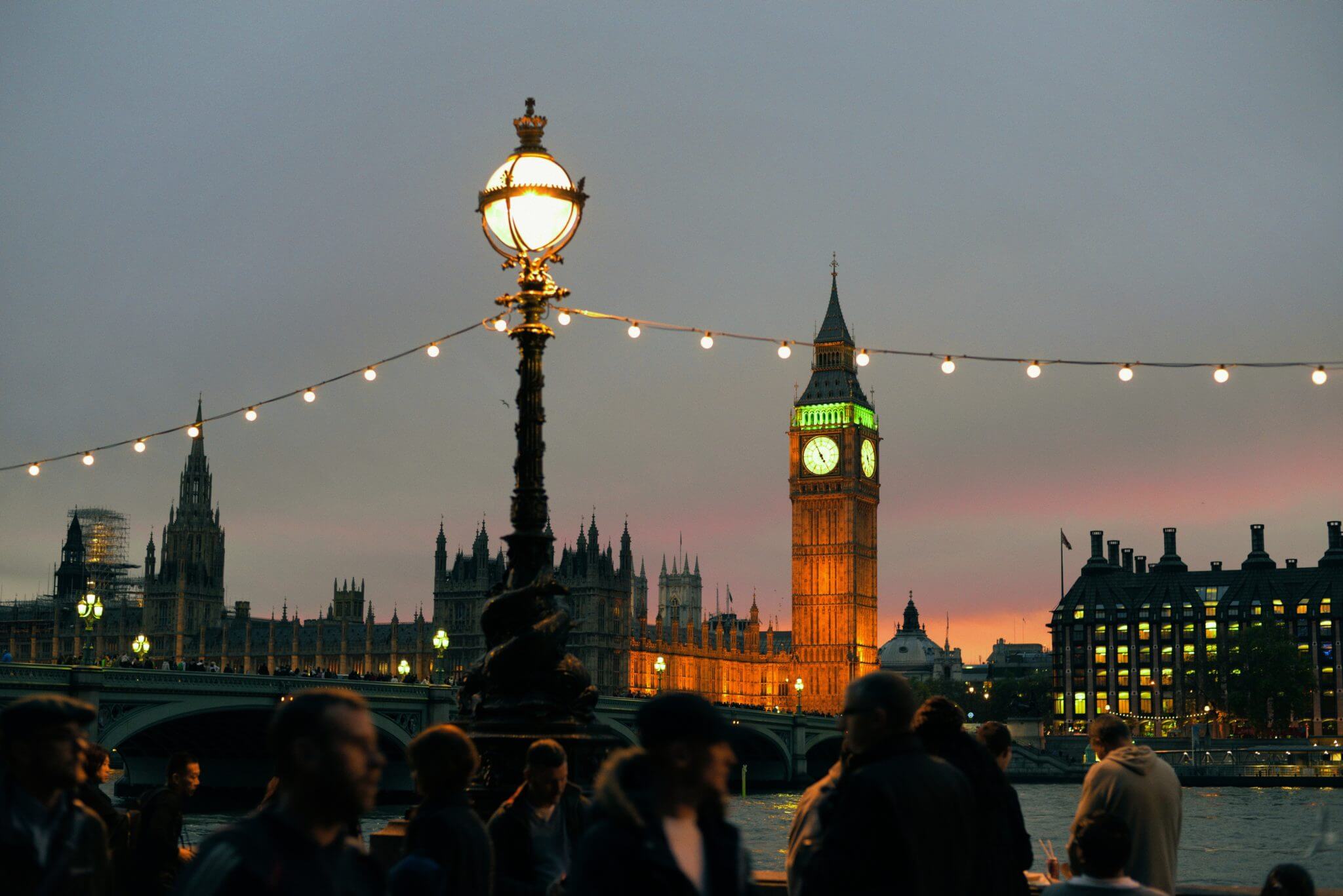
Hospitality and tourism represent the most dynamic, fast-growing industry. To add to that, a career in this industry can be the most exciting step to take for yourself. Potential jobs you may seek are all about communication, adventure, and so many other advantages that have been proven to impact your wellbeing as well, both physically and psychologically. Read below to see the benefits we have highlighted for if you decide to follow this career path.
1. It’s doesn’t feel like work
Most of the jobs in hospitality and tourism are not typical 9-5 jobs. You get to live a hectic life, yes, but at least you get to do that outside the environments of a dull office. Hospitality was ranked #6 in the top 10 ‘Happiest industries’ based on responses such as ‘I’m excited about my work and projects,’ ‘I work with great people’ and ‘I feel recognized and appreciated.’
2. It provides you with global experiences
The nature of this industry is of the sort that you will learn many aspects of the global economy, traditions, and diversity of mindsets. Whether through traveling alone, or doing business with fellow hospitality businesses from different countries, you will see how different and yet alike we are. Learning about different cultures will always be part of your routine in this industry.
3. Social Interaction
You have to be a people’s person to pursue a degree in hospitality and tourism. That’s basically the beauty of it, as you get the chance to meet and greet so many personalities. It might be overwhelming for some individuals; however, it may become some of the things you most look forward to once you realize just how many valuable perspectives you can get from guests and clients with different backgrounds.
4. No day is the same
One day you’re traveling, the other you’re hosting, showing people around, or making sure they have the best experience of the place they’re visiting. This means that you won’t have to wake up every day just to perform the same monotonous tasks. And that adds so much thrill to your days and makes you look forward to work, because you never know what to expect within this industry.
5. Drives your curiosity
As no day is the same, you will always be driven by a curiosity to advance your career and see what else you can learn. We know that studies have shown how travel can broaden the mind, but that’s not the only fact anymore. Science now suggests that you can gain the same benefits that people get from traveling, also by working in the hospitality industry. You’ll have plenty of flexibility to take some time and absorb new things regarding your exciting job or question people for hidden gems.
6. Career growth opportunities
And we’re not just talking about professional growth, but for your personal growth as a human being as well. Upcoming generations are seeking out jobs that will excite them, according to the Harvard Business Review . They claim that ‘growth opportunities’ are some of the most important factors that push them to choose a career over the other. And of course, they will choose a career in hospitality , with all the worldwide travel opportunities and networking advantages.
Is a Degree in Hospitality & Tourism Management Worth It?
The bottom line is that although the hospitality and tourism industry is very exciting and dynamic, it won’t always feel like a never-ending holiday. We’re talking about a highly competitive and dynamic field, which demands well-trained professionals and a serious work ethic. To have all this baggage and stand out from other candidates, you need to complete an in-depth study program. You need this degree specifically if you aim for higher leadership positions because of the entry-level ones you could get even with some years of work experience.
So we do think that a degree in hospitality and tourism is worth it, yet, you should tailor the decision according to your long-term ambitions.
Frequently Asked Questions (FAQs)
What’s the difference between an ms and an mba in hospitality and tourism management.
An MS typically focuses on specialized knowledge and research within the industry, while an MBA emphasizes business administration skills applicable to various sectors, including hospitality.
Are there specific areas of specialization within these programs?
Yes, programs may offer concentrations like hotel management, event planning, sustainable tourism, or destination management, allowing students to delve deeper into their areas of interest.
What career advantages come with a master’s degree in this field?
A master’s can lead to greater industry recognition, increased earning potential, and opportunities for leadership roles.
Is work experience necessary before pursuing a master’s in hospitality and tourism?
While not always mandatory, having work experience can provide valuable insights and context that enrich the learning experience in a master’s program.
Are online programs as reputable as on-campus ones in this field?
Many reputable institutions offer online master’s programs in hospitality and tourism. The key is to ensure accreditation and evaluate factors like faculty expertise and industry connections.
What are some challenges specific to advanced studies in this field?
Challenges might include keeping pace with industry trends, balancing academic commitments with work (for those studying part-time), and ensuring alignment between academic theory and practical industry demands.
Do these programs usually offer networking opportunities or internships?
Yes, many programs facilitate internships or cooperative education experiences to help students gain practical skills. Additionally, they often provide platforms for networking through industry events, conferences, and alumni connections.
Share it with your friends!
Explore more.

Accounting vs. Finance Degree: Which Major to Choose?

12 Important Bookkeeping Skills You Need for a Successful Career
Recent resources.

What Can You Do With a Hospitality Management Degree? Best Hospitality Careers

What Can You Do with an International Studies Degree [2024]

9 Benefits of Learning a Second Language

Associate’s vs. Bachelor’s: Which One To Choose?
INTERESTED IN LEARNING MORE?
Chat with an Admissions Officer Now!

- Associates Degree
- Bachelors Degrees
- Masters Degrees
- Doctoral Degrees
- Faculty & Staff
- Accreditation
- Student Experience
QUICK LINKS
- Admission Requirements
- Military Students
- Financial Aid
5 Majors to Consider for a Career in Hospitality and Tourism
What should you study if you are interested in a career in hospitality and tourism.
Hospitality and Tourism careers include jobs in food or services for people to enjoy leisure activities or vacations.
If you are interested in a career in Hospitality and Tourism here is a list of 5 majors you might consider when thinking about your degree options.
- Hotel and Motel Management Students in this major learn how to manage hotels, motels, and other lodging businesses such as resorts. Course work covers hospitality law, employee management, financial management, and more.
- Meeting and Event Planning Students learn to plan, budget, and implement conferences, meetings, and other special events in the public or private sectors.
- Tourism and Travel Management Tourism and travel majors learn to manage tourism- and travel-related businesses. Course work includes such topics as travel-agency management, tour planning, convention and event planning, and travel industry law.
- Hospitality Administration and Management Hospitality majors learn to run hotels, restaurants, travel agencies, and other businesses that serve business travelers and vacationers.
- Business Administration and Management Business administration majors learn the mechanics of business through classes in fundamentals such as finance, accounting and marketing and delve into more specialized topics. Students find ways to solve problems using data, and they develop communication and managerial skills.
When you think about careers in the Hospitality and Tourism career cluster, these are just a few examples of potential majors to get you started. Explore more majors or search for colleges on BigFuture that offer these or similar majors to start building your college list!
Related Topics
See how Cvent can solve your biggest event challenges. Watch a 30-minute demo.

What Is the Hospitality Industry? Your Complete Guide

What does hospitality mean? What is the hospitality industry, exactly? Where and how did it begin? This post answers all those questions and more as we explore the past, present, and future of hospitality. As we dive deeper into what the industry entails, you’ll discover how hospitality impacts employers, employees, economies, consumers, the environment, and so much more. Whether you’re curious about which businesses are part of the industry, what they do, or how to start a career in hospitality, you’ve come to the right place.
What is the hospitality industry?
The hospitality industry is a massive business sector. Casting a broad umbrella, it encompasses all economic and business activities that rely upon or contribute to travel and tourism. Hospitality-focused businesses like hotels and travel agencies contribute directly by providing essential services that enable travel and tourism. Suppliers, transportation services, and catering companies may indirectly contribute by delivering the goods and services necessary to keep the industry running; however, they do not solely rely on hospitality for their revenue.
Because the hospitality industry is so expansive, it includes a diverse spectrum of companies, businesses, and experts. Even with so much variety, most hospitality businesses fall into one of four categories.
1. Travel & tourism (T&T)
Although many people think travel and tourism are synonymous with hospitality, that’s not quite the case. More accurately, T&T is a specific category within the hospitality industry. It includes airlines, shuttle services, travel agents, destination marketing organizations (DMOs) , and other businesses or services that help facilitate the physical travel necessary for tourism. Those working in T&T help drive tourists, workers, and businesses to new destinations.
2. Accommodation
One of the largest and most diverse parts of the hospitality industry is the accommodation sector, which includes everything from lodging to event grounds and special event venues. Numerous different types of hotels and venues fall into this sector, including:
- Chain hotels
- Extended stay properties
- Boutique hotels
- Conference and convention centers
- Wedding venues
- Casinos/casino suites
3. Food & beverage (F&B)
Most hotels and resorts offer their guests some form of food or dining option. Whether operating a café, buffet breakfast, or full-service restaurant, food and beverage services are integrated directly into many hospitality-based businesses. Stand-alone F&B providers, like restaurants or food trucks, operate independently, but they also have a part to play in the local hospitality scene.
Event catering, quick-service establishments, full-service restaurants, and limited-service F&B are powerful revenue drivers contributing to the hospitality industry. In addition to serving in-house hotel guests, F&B is a critical component of meetings and events, from private parties, like birthdays or weddings, to large-scale corporate events .
4. Recreation & entertainment
Because businesses in the hospitality industry often rely on consumers’ disposable income, they market to customers’ desire for entertainment that refreshes the mind, body, and spirit. In addition to lodging, travel services, and culinary delights, hospitality is full of indoor and outdoor recreation.
Bars, nightclubs, theaters, stadiums, museums, zoos, and other attractions often act as special event venues and tourist attractions, helping to drive a destination’s economy . Spectacular outdoor spaces, including our national and state parks , attract travelers from near and far to feed their local markets.
Whether providing a memorable meal or a relaxing day at the spa, the true purpose of hospitality is to ensure that the customer has an enjoyable experience —whatever they do.
But how did it all get started? How far back do the roots of the hospitality industry actually go?

When did the hospitality industry begin?
Although hospitality doesn’t have a designated start date, its traditions date back thousands of years. Ancient symbols of hospitality exist worldwide, with the oldest signs discovered in French caves dating back to 15,000 BCE . Historians and archeologists believe early humans designed the caves to welcome guests and greet visiting tribes.
Xenia, a phrase translating to “the sacred rule of hospitality,” is another early sign of the tradition. In ancient Greece, the custom expressed the law or expectation that hosts would offer protection and kindness to strangers . The Greeks understood that a satisfactory hospitality experience relied on hosts respecting their guests and vice versa. Furthermore, they believed displaying proper hospitality was “fundamental to human civilized life.” Modern hospitality may not look like it did thousands of years ago, but its purpose remains the same.
Is the hospitality industry growing?
Pre-pandemic, the hotel and motel industries (i.e., hospitality) employed approximately 173 million workers . In our primarily post-pandemic world, the hospitality industry and its partners remain massive global employers. 2022 brought 22 million new jobs to the sector, representing an almost 8% increase since 2021. In 2023, the hospitality positions accounted for one of every ten available jobs .
Although many hospitality-focused businesses (e.g., hotels and restaurants) still face staffing shortages , the industry remains one of the largest global employment sectors. From 2022-2023, the international hospitality industry’s value grew at a compound annual growth rate of 7% . The rebound illustrates consumers’ desire to travel again and return to in-person events after restrictions were lifted. Paralleling this demand increase, the World Travel and Tourism Council estimates that the hospitality industry will create 126 million more jobs by 2032 .
How does the hospitality industry impact the environment?
In 2022, the hospitality industry was responsible for approximately 1% of global carbon emissions . Single-use plastics, high water consumption, energy usage, and excess waste are just a few ways hotels negatively affect their local environment and the overall climate.
To demonstrate a commitment to sustainability , social responsibility, and shifting consumer preferences, the industry is becoming greener through robust global initiatives and innovative day-to-day practices, like these eco-friendly hotel ideas . As consumer attitudes towards environmental conservation and sustainability strengthen, being eco-friendly is no longer optional for most businesses; it’s necessary.
Why work in hospitality?
If you enjoy making other people happy, hospitality might be right for you. It’s an industry where employees work together to create a welcoming atmosphere, satisfy customers, impress hotel guests , and create an exceptional visitor experience. With hotel, events, dining, planning, travel, custom service, and a wide variety of other roles available, there’s an opportunity for every worker and every personality type.
Hospitality is also a dynamic, fast-paced, and ever-changing field. Just as every guest is different, so is every day working in the industry. Whether working in a hotel or nightclub, you get to encounter diverse types of people with varying backgrounds from all over the world. As you connect with various guests and strive to meet their needs, you’ll get exposed to new cultures and expand your life experience.
Additionally, hospitality offers more flexible scheduling than many other industries, as hospitality businesses often operate outside of traditional 9 a.m. to 5 p.m. office hours. Many young people flock to hotels, restaurants, and similar businesses because of the work-life balance they provide. Working in the industry also comes with a diverse range of perks, such as discounted travel, competitive pay rates, and numerous opportunities to advance your career.
Become an expert on all things hospitality
How do you get a job in the hospitality industry?
There are many different paths you can take to begin a hospitality career. While some employees start at an entry-level position and work up the ranks, others translate their past professional experience into a hospitality-focused career. Increase your chances of building a successful career in the hospitality industry by:
1. Identifying which hospitality sector best suits you
The hospitality industry includes diverse careers and professions, making it an excellent sector for workers with various skills and personality types. Whether you’re an introvert who prefers to work alone or a bubbly, conversational individual, hospitality has something for everyone. If you want to work in a hotel, consider which department or position best fits you.
- Front desk: Front-facing, customer-focused positions, great for outgoing personality types
- Housekeeping: Back-of-the-house positions, perfect for task-oriented or meticulous employees
- F&B: Front-facing and back-of-house positions available, often working in a busy, high-stress environment
- Maintenance: Skill-based and goal-focused positions that require big-picture thinkers with excellent task-management skills
- Meetings and events: A range of primarily forward-facing positions available for event planners, organizers, coordinators, and more
2. Knowing where to look
As customer service lies at the heart of hospitality, it’s common for professionals to turn to members of their local network for references, recommendations, and referrals. Many entry-level hospitality jobs are shared through local and employee referrals, the hiring manager’s professional network, or an individual’s social media accounts.
If you already know where you want to work, get to know the people there. Introduce yourself to the management team at hotels, restaurants, and other venues that interest you. If you’re not sure where to start, there are a variety of hospitality employment resources available, including:
- Online advertisements. Online job ads are especially beneficial if you’re new to the industry or a particular destination. If you lack first-person word-of-mouth recommendations, breaking into your local industry may feel intimidating. Keep an eye out for online ads on job boards, local news sites, and search engine results to streamline your search.
- Social media pages. Follow venue Facebook pages, join local hospitality groups, and keep a close eye on the Instagram pages of the hotels or destinations where you want to work. Regularly check social media, scanning for links to external job sites or brand listings.
- Hospitality Online
- iHireHospitality
- Hospitality Crossing
- Hospitality Confidential
- Wyndham Careers
- Hyatt Careers
- Marriott International Careers
- Jobs at Hilton
- IHG Careers
- Accor Careers
- OYO Careers
- Staffing agencies. Staffing and temporary work agencies are fantastic resources for helping individuals get their foot through the door. Although there are various hospitality-specific staffing agencies, like Hospitality Staffing Solutions , it’s also common for local staffing agencies to work directly with nearby hotels as they help fill entry-level positions in guest service, housekeeping, maintenance, and other departments.
3. Expanding your hospitality knowledge
Become a go-to person for all things hospitality, from industry trends to the latest marketing techniques. Stay current on the latest to remain relevant in an increasingly competitive field.
4. Keeping up with industry certifications
Having credentials can significantly impact how quickly you land your dream travel job. Show other hospitality professionals that you’re serious about a career in the industry by holding various certifications, like HubSpot Academy’s Inbound Marketing Certification , a certificate in hospitality revenue management (CRHM), or ServSafe certifications for those involved on the F&B side.
5. Determining your career path
After exploring the wide and wonderful world of hospitality, pick a career path you’re enthusiastic about. Instead of thinking about where to start, consider where you’d like to go in the industry. Visualizing where you want to end up can help determine which steps you should take to advance your career down a path that speaks to you.
Now you know what the hospitality industry is and why it matters!
With a better understanding of how far hospitality extends and its immense influence worldwide, it’s easy to see why the industry is growing. To learn more, join us as we examine the most significant trends impacting the hospitality industry in 2023 .

Kim Campbell
Kim is a full-time copy and content writer with many years of experience in the hospitality industry. She entered the hotel world in 2013 as a housekeeping team member and worked her way through various departments before being appointed to Director of Sales. Kim has championed numerous successful sales efforts, revenue strategies, and marketing campaigns — all of which landed her a spot on Hotel Management Magazine’s “Thirty Under 30” list.
Don’t be fooled though; she’s not all business! An avid forest forager, post-apocalyptic fiction fan, and free-sample-fiend, Kim prides herself on being well-rounded.

More Reading
Congratulations to the 2024 cvent excellence awards finalists, how to market to corporate event planners, what is a hotel business plan, and why you need one.
Subscribe to our newsletter
- Masters Degrees
- Bachelors Degrees
- Associate Degrees
- Career Pathways Bridge Program
- Online Degree Programs: Bachelor’s, Master’s & Associate’s
- Global Offerings
- Faculty Spotlight
- Faculty Directory
- Open Faculty Positions
- Policies and Documents
- Professional Studies
- Continuing Education
- Executive Education for Industry Leaders
- High School Academy
- Areas of study
- Divisions & Departments
- Professional Pathways
- Degree Directory
- Graduate Admissions Criteria
- Graduate Application Requirements and Deadlines
- Graduate Financial Aid
- Summer Publishing Institute
- Undergraduate
- Undergraduate Admissions Criteria
- Undergraduate Application Requirements and Deadlines
- Undergraduate Financial Aid
- Transfer Students
- Adult Learning
- Your Community
- New Students
- DAUS: Military Veterans
- Global Perspective
- Graduate Events
- Undergraduate Events
- Frequently Asked Questions
- Student Success
- Academic Advising
- Student Life
- Resources and Services
- University Life
- Arts, Culture, and Entertainment
- Health and Wellness
- Studying in New York City
- Travel and Transportation
- Policies and Procedures
- NYU SPS Wasserman Center
- Career Success
- Industry Engagement
- Hire NYU Talent
- Faculty Engagement
- STUDENTS & ALUMNI: GET STARTED
- Events Central
- Office of Events
- Meet the Team
- SPS Conference Room and Event Spaces
- Event Request Form
- Event Guidelines
- Conferences
- Hospitality Conference
- Capital Markets in Real Estate
- Women in Real Estate
- REIT Symposium
- NYU Coaching and Technology Summit
- Future Workforce Global Summit
- NYU SPS Events
- Undergraduate Convocation
- Graduate Convocation
- Student Events
- Capstone Fair
- Alumni Advantage
- Alumni Stories
- Current Alumni
- Give to NYU SPS
- Parents Council
- SPS Reunion
- NYU SPS Home
- BS in Hospitality, Travel and Tourism Management

Bachelor of Science (BS) in Hospitality, Travel and Tourism Management
If you are considering a hospitality major as your undergraduate program of study, the BS in Hospitality, Travel and Tourism Management, offered by the Jonathan M. Tisch Center of Hospitality prepares students for careers in hospitality, travel and tourism, tourism experience management, hotel and resort management, and hotel real estate development. The curriculum provides you with flexibility to explore career options way beyond what a typical hospitality and tourism degree might offer. As a student enrolled in this program, you’ll benefit immensely from earning your degree at NYU , home to more than 50,000 students from around the globe, while launching your career in New York City—a location defined by its world-class hotels and tourist attractions.
Degree Advantage
- Curriculum prepares students for hospitality and tourism jobs around the world
- Provides an NYU liberal arts education
- Concentrations in Event Management , Hotel Real Estate Finance and Development , Marketing and Analytics , Leadership and Management , Travel and Tourism Development , and Entrepreneurship
- Internships at leading NYC hotels, restaurants, tourism bureaus, online travel agencies, and promotional companies
- Study abroad opportunities and industry site visits
- New Hospitality Innovation Hub for students, start ups, and industry partners
VIEW FULL CURRICULUM AND DEGREE REQUIREMENTS >
Who should earn the bs in hospitality, travel and tourism management.
If you have a passion for travel, love to interact with people, and have an innate curiosity to learn about different cultures, this degree provides the knowledge and skills needed for a hospitality career. The diversity of the Tisch Center student body and faculty members promotes a worldview that will be critical for your success in a field that is more globally interconnected than ever before.
Degree Overview
Learn from a faculty of world-renowned experts.
Faculty members are respected experts in the hospitality, hotel management, and travel and tourism sectors who share their knowledge, insights, experiences, and connections. They work directly with you to ensure that you identify and pursue the professional path that best fits your career goals and objectives. Their support and deep dedication is what makes earning a degree from the Tisch Center an experience unlike all others.
Gain Invaluable Experience Through Study Abroad
Study abroad opportunities abound for BS in Hospitality, Travel and Tourism Management students through Global Field Intensives (GFIs). These travel experiences provide international business experience while attuning students to the cultural, socio-economic, and political forces that influence the international hospitality, and travel and tourism industries. Recent GFIs include trips to: Abu Dhabi, Dubai, Prague, and Berlin.
Benefit from Unsurpassed Networking Opportunities
The BS in Hospitality, Travel and Tourism Management provides unsurpassed networking opportunities through the annual NYU International Hospitality Industry Investment Conference , chaired by Jonathan M. Tisch , chairman and CEO of Loews Hotels and Co. (left); the Grossinger-Bergman Distinguished Lecturer Series, which features hospitality leaders such as David Marriott ; and fireside chats with the likes of famed chefs and restaurateurs Daniel Boulud and Danny Meyer .
Internships and Job Opportunities
Through the Tisch Center of Hospitality and the NYU Wasserman Center for Career Development at NYU SPS, hospitality, travel and tourism management majors have the opportunity to complete a wide range of hospitality, and travel and tourism internships that provide the hands-on experience needed to accelerate their careers. Many of these internships evolve into permanent hospitality and tourism jobs. Our graduates go on to careers at top hotel chains, boutique hotels, travel organizations, tourism bureaus, media companies, restaurants, and food and beverage companies including:
- Estee Lauder Companies
- Four Seasons Hotels and Resorts
- Loews Hotels
- Marriott International
- The Standard Hotels
- Walt Disney World
FREQUENTLY ASKED QUESTIONS
How does this degree differ from a hospitality management degree.
The BS in Hospitality, Travel and Tourism Management differs from a hospitality management degree in its holistic approach to the hospitality, travel, and tourism sectors. While traditional undergraduate hospitality management degrees focus on hotels and restaurants, you will have the opportunity in this degree to also explore subjects like destination marketing, tourism development, and event management.
Will this degree prepare me for hotel management jobs?
The BS in Hospitality, Travel and Tourism Management will prepare you for a range of hotel industry jobs and career paths. You will have the opportunity to specialize in your field of interest, including hotel or tourism operations, sales and marketing, revenue management or hotel development. Our students secure internships and work at large multinational hotel chains as well as independent boutique hotels.
Is tourism management a growing field?
Tourism management offers a broad range of career options for those who are interested in pursuing tourism jobs. The tourism sector has experienced incredible growth in the past decades. with 1.8 billion tourists—just over one in five persons in the world—traveling around the globe by 2030 (UNWTO). The BS in Hospitality, Travel and Tourism Management provides students with the opportunity to secure internships at a broad range of tourism destinations including Walt Disney World.
Can an undergraduate hotel management degree help my career?
An undergraduate hotel management degree can help your career, because it will provide you with a wealth of business skills and the networking opportunities that can lead to a wide variety of hotel management jobs. The hospitality sector is vast and offers a wealth of career choices, but even if you decide to switch career paths, the business foundation you acquire will allow you to pursue a career in a variety of other professional sectors. In addition, earning an undergraduate degree at NYU will open the doors to job opportunities in New York City and around the world.
What are the advantages of earning a hospitality management degree in New York City?
The advantage of earning your hospitality management degree in New York City is that you will be studying in the hospitality capital of the world. New York City is home to top hotels, the finest restaurants, major tourist attractions and thousands of world-famous events. The City will become your professional base for exploring your interests in hospitality, travel and tourism management and for gaining the experience you need to secure a job in this growing field.
- Admissions Overview
- Undergraduate Admissions
- Graduate Degree Programs
- International Student Admissions
- Academics Overview
- Undergraduate Majors & Minors
- Graduate School
- Purdue Online Learning
- Tour Purdue’s Campus
- Research and Innovation Overview
- Research & Partnerships
- Corporate & Global Partnerships
- Purdue Research Foundation
- About Purdue
- Office of the President
- Commitment to Free Speech
- Student Life at Purdue
- Purdue Activity & Wellness
- Campus Inclusion
- Prospective Students
- Current Students
- Faculty and Staff
- Purdue Northwest
- Purdue Fort Wayne
- Purdue Global
- Purdue Online
Hospitality and Tourism Management Major
White Lodging-J.W. Marriott, Jr. School of Hospitality and Tourism Management
Consistently ranked as one of the leading hospitality and tourism management programs, both globally and nationally, Purdue’s hospitality and tourism management program will immerse you in the fast-paced hospitality industry and prepare you to work in a variety of management positions. Hospitality is internationally relevant and a powerful economic driver, and Purdue’s hospitality and tourism management major equips you with valuable skills to create memorable experiences for consumers.
Coursework is challenging and relevant to today’s workforce needs, and you’ll learn from faculty who bring years of industry experience into the classroom. To prepare you to be a well-rounded hospitality business professional, courses explore accounting, marketing, lodging, food service, tourism, human resource management, law and more. The major also offers a strong foundation of management classes. Additionally, the program’s hands-on learning experiences will prepare you to work in any facet of the industry, from food service to lodging to tourism and beyond. You’ll also participate in a 320-hour hospitality and tourism management paid internship that aligns with your professional career goals.
Through a tremendous partnership with White Lodging — a relationship that is unique to Purdue — students are also provided with opportunities and support from a leading hospitality company that is second to none. The White Lodging LAUNCH Hospitality Immersion Program provides hospitality and tourism students the opportunity to work on campus at the Union Club Hotel , part of Marriott’s Autograph Collection of brands. These world-class facilities provide an exceptional learning laboratory for students, and is the only luxury student-run hotel of its kind.
Career Opportunities
Students who majored in hospitality and tourism management have a 98% job placement rate, finding successful careers at Amazon, Disney, Hilton Hotels and Resorts, Marriott International, White Lodging Services, and more. The following are notable career paths for hospitality and tourism management majors:
- Account executive
- Airline operations manager
- Catering director
- Convention/event planner
- Corporate recruiter
- Corporate travel manager
- Country club manager
- Director, convention and visitors bureaus
- Entrepreneur
- Events services manager
- Event planner
- Facilities manager (casino, healthcare, resort, sports venue, etc.)
- Food and beverage director
- Food service manager
- Hotel general manager
- Hotel operations director
- Human resources recruiter
- Marketing associate
- Product/equipment supplier
- Property manager
- Reservations coordinator
- Restaurant designer
- Restaurant owner/manager
- Revenue manager
- Sales representative
- Travel agency manager
Career Resources
- The HTM Career Center provides career planning services and coordinates more than 700 interviews each year.
- HTM Career Day brings representatives from the industry to campus each fall for a career fair, keynote address and reception for employers and students.
- The Center for Career Opportunities offers additional career fairs and assistance.
- The Certificate in Entrepreneurship and Innovation can complement your hospitality and tourism management degree without the need to take additional credits.
Learning Experiences
- Connect all your hospitality and tourism management knowledge in the capstone course as you build your own hospitality business with a team of classmates.
- Complete two mandatory paid internships .
- Immerse yourself in a world-class hotel learning experience right on campus at the Union Club Hotel when participating in White Lodging’s LAUNCH Hospitality Immersion Program .
- Train in the school’s two restaurants : the John Purdue Room (fine dining) and the Boiler Bistro (quick service).
- Complete an optional six-month paid internship at a Shangri-La Hotel in China, or study abroad at various destinations around the world.
- Join HTM student organizations that are mentored by our award-winning faculty, including the HTM Society, which organizes the annual Black Tie Dinner fundraising event.
- Enhance your plan of study by completing the event and meeting management minor or a certificate in the White Lodging-J.W. Marriott, Jr. School of Hospitality and Tourism Management.
- Participate in research activities to explore of a variety of topics within hospitality and tourism management.
Program Quick Facts
Degree Type: Bachelor’s
Location: West Lafayette
Department/School: White Lodging-J.W. Marriott, Jr. School of Hospitality and Tourism Management

Concentrations
Environmental Sustainability
The optional environmental sustainability concentration examines issues related to sustainability in the hospitality and tourism industry. Courses cover sustainable tourism and responsible travel, environmental ethics, environmental policy and more.
Hospitality Facilities Design and Management
The optional hospitality facilities design and management concentration allows you to focus on the systems, technology and architectural components of the hospitality industry. Courses cover mechanical and electrical systems, technology systems, construction management, facility design, project management and more.
Marketing and Sales
The optional marketing and sales concentration is designed for individuals interested in the process of generating revenue for hospitality and tourism businesses. Courses cover public relations, advertising, relationship selling, marketing, consumer behavior and more.
The optional finance concentration allows you to gain in-depth knowledge of managing financial affairs and financial decision-making in the business world. Courses cover investment management, corporate finance, international finance and more.
“Growing up as a part of a military family, I have moved many times. When it came time to select a university, I was living in Germany and had no idea where I wanted to go, but I knew I wanted to become an event management professional. After doing my research, I chose Purdue because of its highly esteemed HTM program!” — Claire
Hometown: Fayetteville, North Carolina Major: Hospitality & Tourism Management Why Purdue: Growing up as a part of a military family, I have moved many times. When it came time to select a university, I was living in Germany and had no idea where I wanted to go, but I knew I wanted to become an event management professional. After doing my research, I chose Purdue because of its highly esteemed HTM program! Favorite Place at Purdue: My favorite place at Purdue is either the Marriott atrium or Mackey Arena. So many fun memories in both of those locations! Advice for an Incoming Freshman: Don’t be afraid to change! College is all about finally having the chance to become someone you’ve always wanted to be. Seek out exciting opportunities to learn and grow, and trust me, these four years go by so fast, and you don’t want to waste a minute of it! I’m the president of HTM Society’s Black Tie Dinner , if you have questions about anything please contact [email protected] . Instagram: @purdueblacktie
Other Hospitality and Tourism Management Majors
Travel, Tourism & Hospitality
Global tourism industry - statistics & facts
What are the leading global tourism destinations, digitalization of the global tourism industry, how important is sustainable tourism, key insights.
Detailed statistics
Total contribution of travel and tourism to GDP worldwide 2019-2033
Number of international tourist arrivals worldwide 1950-2023
Global leisure travel spend 2019-2022
Editor’s Picks Current statistics on this topic
Leading global travel markets by travel and tourism contribution to GDP 2019-2022
Travel and tourism employment worldwide 2019-2033
Further recommended statistics
- Basic Statistic Total contribution of travel and tourism to GDP worldwide 2019-2033
- Basic Statistic Travel and tourism: share of global GDP 2019-2033
- Basic Statistic Leading global travel markets by travel and tourism contribution to GDP 2019-2022
- Basic Statistic Global leisure travel spend 2019-2022
- Premium Statistic Global business travel spending 2001-2022
- Premium Statistic Number of international tourist arrivals worldwide 1950-2023
- Basic Statistic Number of international tourist arrivals worldwide 2005-2023, by region
- Basic Statistic Travel and tourism employment worldwide 2019-2033
Total contribution of travel and tourism to gross domestic product (GDP) worldwide in 2019 and 2022, with a forecast for 2023 and 2033 (in trillion U.S. dollars)
Travel and tourism: share of global GDP 2019-2033
Share of travel and tourism's total contribution to GDP worldwide in 2019 and 2022, with a forecast for 2023 and 2033
Total contribution of travel and tourism to GDP in leading travel markets worldwide in 2019 and 2022 (in billion U.S. dollars)
Leisure tourism spending worldwide from 2019 to 2022 (in billion U.S. dollars)
Global business travel spending 2001-2022
Expenditure of business tourists worldwide from 2001 to 2022 (in billion U.S. dollars)
Number of international tourist arrivals worldwide from 1950 to 2023 (in millions)
Number of international tourist arrivals worldwide 2005-2023, by region
Number of international tourist arrivals worldwide from 2005 to 2023, by region (in millions)
Number of travel and tourism jobs worldwide from 2019 to 2022, with a forecast for 2023 and 2033 (in millions)
- Premium Statistic Global hotel and resort industry market size worldwide 2013-2023
- Premium Statistic Most valuable hotel brands worldwide 2023, by brand value
- Basic Statistic Leading hotel companies worldwide 2023, by number of properties
- Premium Statistic Hotel openings worldwide 2021-2024
- Premium Statistic Hotel room openings worldwide 2021-2024
- Premium Statistic Countries with the most hotel construction projects in the pipeline worldwide 2022
Global hotel and resort industry market size worldwide 2013-2023
Market size of the hotel and resort industry worldwide from 2013 to 2022, with a forecast for 2023 (in trillion U.S. dollars)
Most valuable hotel brands worldwide 2023, by brand value
Leading hotel brands based on brand value worldwide in 2023 (in billion U.S. dollars)
Leading hotel companies worldwide 2023, by number of properties
Leading hotel companies worldwide as of June 2023, by number of properties
Hotel openings worldwide 2021-2024
Number of hotels opened worldwide from 2021 to 2022, with a forecast for 2023 and 2024
Hotel room openings worldwide 2021-2024
Number of hotel rooms opened worldwide from 2021 to 2022, with a forecast for 2023 and 2024
Countries with the most hotel construction projects in the pipeline worldwide 2022
Countries with the highest number of hotel construction projects in the pipeline worldwide as of Q4 2022
- Premium Statistic Airports with the most international air passenger traffic worldwide 2022
- Premium Statistic Market value of selected airlines worldwide 2023
- Premium Statistic Global passenger rail users forecast 2017-2027
- Premium Statistic Daily ridership of bus rapid transit systems worldwide by region 2023
- Premium Statistic Number of users of car rentals worldwide 2019-2028
- Premium Statistic Number of users in selected countries in the Car Rentals market in 2023
- Premium Statistic Carbon footprint of international tourism transport worldwide 2005-2030, by type
Airports with the most international air passenger traffic worldwide 2022
Leading airports for international air passenger traffic in 2022 (in million international passengers)
Market value of selected airlines worldwide 2023
Market value of selected airlines worldwide as of May 2023 (in billion U.S. dollars)
Global passenger rail users forecast 2017-2027
Worldwide number of passenger rail users from 2017 to 2022, with a forecast through 2027 (in billion users)
Daily ridership of bus rapid transit systems worldwide by region 2023
Number of daily passengers using bus rapid transit (BRT) systems as of April 2023, by region
Number of users of car rentals worldwide 2019-2028
Number of users of car rentals worldwide from 2019 to 2028 (in millions)
Number of users in selected countries in the Car Rentals market in 2023
Number of users in selected countries in the Car Rentals market in 2023 (in million)
Carbon footprint of international tourism transport worldwide 2005-2030, by type
Transport-related emissions from international tourist arrivals worldwide in 2005 and 2016, with a forecast for 2030, by mode of transport (in million metric tons of carbon dioxide)
Attractions
- Premium Statistic Leading museums by highest attendance worldwide 2019-2022
- Basic Statistic Most visited amusement and theme parks worldwide 2019-2022
- Basic Statistic Monuments on the UNESCO world heritage list 2023, by type
- Basic Statistic Selected countries with the most Michelin-starred restaurants worldwide 2023
Leading museums by highest attendance worldwide 2019-2022
Most visited museums worldwide from 2019 to 2022 (in millions)
Most visited amusement and theme parks worldwide 2019-2022
Leading amusement and theme parks worldwide from 2019 to 2022, by attendance (in millions)
Monuments on the UNESCO world heritage list 2023, by type
Number of monuments on the UNESCO world heritage list as of September 2023, by type
Selected countries with the most Michelin-starred restaurants worldwide 2023
Number of Michelin-starred restaurants in selected countries and territories worldwide as of July 2023
Online travel market
- Premium Statistic Online travel market size worldwide 2017-2028
- Premium Statistic Estimated desktop vs. mobile revenue of leading OTAs worldwide 2023
- Premium Statistic Number of aggregated downloads of leading online travel agency apps worldwide 2023
- Basic Statistic Market cap of leading online travel companies worldwide 2023
- Premium Statistic Estimated EV/Revenue ratio in the online travel market 2024, by segment
- Premium Statistic Estimated EV/EBITDA ratio in the online travel market 2024, by segment
Online travel market size worldwide 2017-2028
Online travel market size worldwide from 2017 to 2023, with a forecast until 2028 (in billion U.S. dollars)
Estimated desktop vs. mobile revenue of leading OTAs worldwide 2023
Estimated desktop vs. mobile revenue of leading online travel agencies (OTAs) worldwide in 2023 (in billion U.S. dollars)
Number of aggregated downloads of leading online travel agency apps worldwide 2023
Number of aggregated downloads of selected leading online travel agency apps worldwide in 2023 (in millions)
Market cap of leading online travel companies worldwide 2023
Market cap of leading online travel companies worldwide as of September 2023 (in million U.S. dollars)
Estimated EV/Revenue ratio in the online travel market 2024, by segment
Estimated enterprise value to revenue (EV/Revenue) ratio in the online travel market worldwide as of April 2024, by segment
Estimated EV/EBITDA ratio in the online travel market 2024, by segment
Estimated enterprise value to EBITDA (EV/EBITDA) ratio in the online travel market worldwide as of April 2024, by segment
Selected trends
- Premium Statistic Global travelers who believe in the importance of green travel 2023
- Premium Statistic Sustainable initiatives travelers would adopt worldwide 2022, by region
- Premium Statistic Airbnb revenue worldwide 2017-2023
- Premium Statistic Airbnb nights and experiences booked worldwide 2017-2023
- Premium Statistic Technologies global hotels plan to implement in the next three years 2022
- Premium Statistic Hotel technologies global consumers think would improve their future stay 2022
Global travelers who believe in the importance of green travel 2023
Share of travelers that believe sustainable travel is important worldwide in 2023
Sustainable initiatives travelers would adopt worldwide 2022, by region
Main sustainable initiatives travelers are willing to adopt worldwide in 2022, by region
Airbnb revenue worldwide 2017-2023
Revenue of Airbnb worldwide from 2017 to 2023 (in billion U.S. dollars)
Airbnb nights and experiences booked worldwide 2017-2023
Nights and experiences booked with Airbnb from 2017 to 2023 (in millions)
Technologies global hotels plan to implement in the next three years 2022
Technologies hotels are most likely to implement in the next three years worldwide as of 2022
Hotel technologies global consumers think would improve their future stay 2022
Must-have hotel technologies to create a more amazing stay in the future among travelers worldwide as of 2022
- Premium Statistic Travel and tourism revenue worldwide 2019-2028, by segment
- Premium Statistic Distribution of sales channels in the travel and tourism market worldwide 2018-2028
- Premium Statistic Inbound tourism visitor growth worldwide 2020-2025, by region
- Premium Statistic Outbound tourism visitor growth worldwide 2020-2025, by region
Travel and tourism revenue worldwide 2019-2028, by segment
Revenue of the global travel and tourism market from 2019 to 2028, by segment (in billion U.S. dollars)
Distribution of sales channels in the travel and tourism market worldwide 2018-2028
Revenue share of sales channels of the travel and tourism market worldwide from 2018 to 2028
Inbound tourism visitor growth worldwide 2020-2025, by region
Inbound tourism visitor growth worldwide from 2020 to 2022, with a forecast until 2025, by region
Outbound tourism visitor growth worldwide 2020-2025, by region
Outbound tourism visitor growth worldwide from 2020 to 2022, with a forecast until 2025, by region
Further reports
Get the best reports to understand your industry.
Mon - Fri, 9am - 6pm (EST)
Mon - Fri, 9am - 5pm (SGT)
Mon - Fri, 10:00am - 6:00pm (JST)
Mon - Fri, 9:30am - 5pm (GMT)
- Skip to main content
- Keyboard shortcuts for audio player
More hotels are catering to the 'bleisure' — business and leisure — traveler

Alina Selyukh
"Bleisure" is a new term in hospitality, a combination of business and leisure travel. It's part of a post-pandemic reset of our travel habits.
Copyright © 2024 NPR. All rights reserved. Visit our website terms of use and permissions pages at www.npr.org for further information.
NPR transcripts are created on a rush deadline by an NPR contractor. This text may not be in its final form and may be updated or revised in the future. Accuracy and availability may vary. The authoritative record of NPR’s programming is the audio record.
- Skip to main content
- Skip to footer
AgriLife Today
Texas A&M AgriLife's digital magazine and newsroom
Chen joins Department of Hospitality, Hotel Management and Tourism
Fulbright scholar brings academic depth, teaching innovation and industry engagement.
September 6, 2023 - by Paul Schattenberg
Po-Ju Chen, Ph.D., a Fulbright Scholar, recently joined the Department of Hospitality, Hotel Management and Tourism in the Texas A&M College of Agriculture and Life Sciences as a professor.

“We are fortunate to have Dr. Chen’s expertise and academic accomplishment in hospitality and tourism added to our newly re-formed department ,” said Brian King, Ph.D., department head. “Our students will benefit enormously from her breadth of knowledge and experience as well as her creative approach to teaching. She brings impressive thought leadership and academic understanding to the hospitality and tourism field.”
Prior to joining Texas A&M University , she served as associate executive director of the School of Hotel and Restaurant Management at the W. A. Franke College of Business at Northern Arizona University in Flagstaff. Before that, she was chair of the Hospitality and Tourism Administration Department in the School of Business at North Carolina Central University in Durham.
Chen earned her doctoral and master’s degrees from Pennsylvania State University. After 16 years of tenure, Chen was made a professor at Rosen College of Hospitality Management at the University of Central Florida in Orlando.
She held the position of professor at Northern Arizona University and endowed professor at North Carolina Central University.
Chen’s research, publications, teaching
Chen’s primary research focuses on consumer behaviors in hospitality, tourism and services management. She also focuses on entrepreneurship, innovation, sustainability and cross-cultural research.
“I became interested in these areas stemming from my early career in the airline industry in the customer services department,” Chen said. “In academia, I had the privilege of working with prestigious researchers and young scholars furthering these lines of research.”
For applied research, she said she had the privilege to partner with various hospitality and tourism leaders and organizations, including destination management organizations, parks, restaurants, hotel companies and attractions/theme parks.
Chen is the co-executive editor of the Journal of Hospitality and Tourism Education and has served as co-executive editor of the Journal of Hospitality and Tourism Cases — both journals affiliated with the International Council of Hotel, Restaurant and Institutional Education. She is also a board director at large for of the International Society of Travel and Tourism Association .
She has published articles in leading business and hospitality/tourism research journals and has received several research awards and other types of recognition for her academic contributions. These include Fulbright Research in Social Entrepreneurship, Austria; Innovation and Creativity Fulbright Lecture Award, Denmark; Jewish National Fund Fellow, U.S. and Israel, and Shanghai Overseas Scholar, China. Her teaching excellence earned her the John Wiley and Sons Award for Innovation in Teaching, Teaching/Research Award in 2012 and 2015. She was also the University of Central Florida Walt Disney World continuing education instructor in Guest Services Management and Leadership and Strategic Management.
Industry, community connections
In addition to her academic accomplishments, Chen has also been active in developing industry partnerships and expanding community outreach on a national and international scale.
Some of these efforts include serving as the Florida Green Lodging Education liaison, president of the Professional Businesswomen Association and president of the Florida/Caribbean Chapter of Council of Hotel, Restaurant and Institutional Educators.
From 2014-2016, Chen served as the primary data analyst for the Institute of Internal Auditors Body of Knowledge. And since 2021, she has collaborated with the American Hotels and Lodging Association’s Castell College program that helps hospitality students learn about future career opportunities.
Chen said she has developed these partnerships as a means of furthering outreach and bridging academia and industry for hospitality and tourism education and research to benefit scholars and students. She said engaging industry practitioners in the classroom enhances learning by gaining firsthand knowledge, seeing how theories learned in the classroom can be applied, and understanding current issues related to hospitality and tourism management.
“I’m looking forward to working with industry leaders and department colleagues to cultivate future leaders of hospitality, hotel and tourism industries,” she said.

A member of Texas A&M AgriLife
Texas A&M AgriLife Extension Service | Texas A&M AgriLife Research | Texas A&M Forest Service | Texas A&M Veterinary Medical Diagnostic Lab | College of Agriculture & Life Sciences
Texas A&M AgriLife
Phone: (979) 803-1287 [email protected]
More Information
- Resources for Press and Media
- Story Suggestion
Find Us on Social Media
About texas a&m university.

Information and Communication Technologies in Tourism 2024
ENTER 2024 International eTourism Conference, Izmir, Türkiye, January 17-19
- Conference proceedings
- Open Access
- © 2024
You have full access to this open access Conference proceedings
- Katerina Berezina 0 ,
- Lyndon Nixon 1 ,
- Aarni Tuomi ORCID: https://orcid.org/0000-0002-0515-1313 2
Department of Nutrition and Hospitality Management, University of Mississippi, University, USA
You can also search for this editor in PubMed Google Scholar
Department of New Media Technology, MODUL University Vienna, Vienna, Austria
Haaga-helia university of applied sciences, helsinki, finland.
- This book is open access, which means that you have free and unlimited access
- Explores the ways in which information and communication technologies in tourism drive innovation
- Features special sections on artificial intelligence in tourism and technologies in tourism education
Part of the book series: Springer Proceedings in Business and Economics (SPBE)
Included in the following conference series:
- ENTER: ENTER e-Tourism Conference
Conference proceedings info: ENTER 2024.
27k Accesses
6 Altmetric
Buy print copy
- Durable hardcover edition
- Dispatched in 3 to 5 business days
- Free shipping worldwide - see info
Tax calculation will be finalised at checkout
Table of contents (46 papers)
Front matter, ai for future tourism and hospitality, preference management in a single user group recommender system.
- Hanif Emamgholizadeh, Amra Delić, Francesco Ricci
How Distinct and Aligned with UGC is European Capitals’ DMO Branding on Instagram?
- Lyndon J. B. Nixon
Automated Topic Analysis with Large Language Models
- Andrei Kirilenko, Svetlana Stepchenkova
AI-Generated Future: What Awaits Tourism and Hospitality with AI-Based Deep Learning Technologies?
- Ayşe Collins, Seyid Amjad Ali, Semih Yılmaz
Innovations in Destination Marketing and Management
Cross-cultural differences in emotional response to destination commercials.
- Christian Weismayer, Ilona Pezenka
Authentication of SMIs by Culturally Different Audiences: Investigation with Chat GPT-3 Prompt Engineering
- Svetlana Stepchenkova, Andrei Kirilenko, Jing Yang
Varying Roles of Destination Management Organizations in the Digital Business Ecosystem of Tourist Destinations
- Volha Herasimovich, Aurkene Alzua-Sorzabal, Basagaitz Guereño-Omil, Daniela Thiel-Ellul
Does More Data Create Better Strategies for Destinations?
- Anne-Maria Moilanen, Juho Pesonen, Johanna Heinonen
Emerging Technologies in Tourism Education
Can chatgpt inspire me evaluate students’ questioning techniques on ai tool for overcoming fixation.
- Rosanna Leung, Iris Sheungting Lo
Applying Design Thinking to Improve Students’ Experience in Online Hospitality Courses
- Katerina Berezina, Rasoul Mahdavi, Mahsa Talebi
Escaping the Routine: Virtual Escape Rooms in Online Hospitality Courses
- Katerina Berezina, Olena Ciftci, Mahsa Talebi, Rasoul Mahdavi
Immersive Technologies in Tourism
Body and mind in virtual dark tourism experiences and artwork creations: embodied cognition reaction perspectives.
- Halim Budi Santoso, Benjamin Quarshie, Dandison Ukpabi, Jyun-Cheng Wang
A Journey for All Senses: Multisensory VR for Pre-travel Destination Experiences
- Jakob C Uhl, Barbara Prodinger, Markus Murtinger, Armin Brysch
Hospitality in the Cyborg Age: The Power of Brain-Computer Interfaces in a Field-Experiment
- Alexander Kiess, Alexander Lennart Schmidt
Enhancing the Museum Experience on the Metaverse: The Blend of Technological Embodiment and Social Presence
- Carlos Flavián, Sergio Ibáñez-Sánchez, Carlos Orús
Other volumes
- Artificial General Intelligence (AGI) in tourism and hospitality
- Emerging technologies in tourism education
- Hospitality technology
- ICT in Tourism
- Virtual Reality (VR) in tourism and hospitality
About this book
For more than 30 years, Information and Communication Technology (ICT) has been revolutionizing travel, tourism, and hospitality, and as we look to the next 30 years, the change of pace does not seem to be diminishing. This open-access book provides an extensive overview of the latest developments of ICTs in the tourism and hospitality industry. Featuring papers presented at the International Federation for IT and Travel & Tourism’s (IFITT) 31st annual ENTER International eTourism Conference (ENTER24) held in Izmir, Türkiye, this book presents research on topics such as artificial general intelligence (AGI) in tourism and hospitality; emerging technologies in tourism education; virtual reality; technologies for sustainability, health and wellbeing; big data and analytics, among others.
This is an open access book.
Editors and Affiliations
Katerina Berezina
Lyndon Nixon
Aarni Tuomi
About the editors
Katerina Berezina is an Associate Professor in the Department of Nutrition and Hospitality Management and Director of the Hospitality Management Program at the University of Mississippi (USA). Dr. Berezina’s research interests are in the areas of information technology in hospitality and tourism, electronic distribution, and revenue management. She serves as Managing Editor of the Journal of Hospitality and Tourism Technology (JHTT).
Lyndon Nixon is an Assistant Professor in the School of Applied Data Science at Modul University Vienna (Austria). His research interests cover the visual classification of photography to automatically extract the touristic destination image from social networks such as Instagram; the use of deep learning for predictive analytics in open domains such as predicting the next trending topic in online channels; and the extraction and modelling of knowledge about events in graph structures and their combination withneural networks to improve computational understanding of the world.
Bibliographic Information
Book Title : Information and Communication Technologies in Tourism 2024
Book Subtitle : ENTER 2024 International eTourism Conference, Izmir, Türkiye, January 17-19
Editors : Katerina Berezina, Lyndon Nixon, Aarni Tuomi
Series Title : Springer Proceedings in Business and Economics
DOI : https://doi.org/10.1007/978-3-031-58839-6
Publisher : Springer Cham
eBook Packages : Business and Management , Business and Management (R0)
Copyright Information : The Editor(s) (if applicable) and The Author(s) 2024
Hardcover ISBN : 978-3-031-58838-9 Published: 04 May 2024
Softcover ISBN : 978-3-031-58841-9 Due: 04 June 2024
eBook ISBN : 978-3-031-58839-6 Published: 03 May 2024
Series ISSN : 2198-7246
Series E-ISSN : 2198-7254
Edition Number : 1
Number of Pages : XIX, 454
Number of Illustrations : 30 b/w illustrations, 68 illustrations in colour
Topics : Tourism Management , Artificial Intelligence , IT in Business , Corporate Environmental Management
- Publish with us
Policies and ethics
- Find a journal
- Track your research
VisitNorfolk’s Champion of Hospitality Awards for National Travel and Tourism Week 2024
May 19-25, 2024 is National Travel and Tourism Week (NTTW), an annual tradition to celebrate the U.S. travel community and tourism’s essential role in stimulating economic growth, cultivating vibrant communities, creating quality job opportunities, inspiring new businesses and elevating the quality of life for Americans every day.
Tourism is essential to our region and plays an integral role in Norfolk’s economy. As the third largest economic driver for our city, the travel and tourism industry mobilized a $149.7 million impact in fiscal year 2023. With over 7,000 jobs in the tourism and hospitality sector , our industry attracts a multitude of talents and provides significant economic benefits to both local businesses and Norfolk residents.
To celebrate tourism in our city and to shine a light on the individuals and teams who make Norfolk such a welcoming city to experience, VisitNorfolk established in 2002 the Champion of Hospitality Awards. In March and April, we invited anyone who has had a positive hospitality experience in Norfolk to nominate an individual or an entire team for the Champion of Hospitality Awards. We are excited to share the winners of this year’s awards and encourage you to visit these Champions of Hospitality in person during your next Norfolk experience.
Peter G. Decker, Jr. Hospitality Associate of the Year

Mary Buting Laundry Attendant DoubleTree By Hilton Hotel Norfolk Airport
Since 1994, Mary Buting has remained a steadfast and loyal employee in the laundry department of the DoubleTree by Hilton Hotel Norfolk Airport. She’s fluffed and folded laundry for guests, working extra hours and going above and beyond during Covid to clean rooms and spot check the lobby, something she said she’d never done before.
“That was a hard job,” she says. “I did a little bit of everything.”
This can-do attitude has led coworkers to say, “She is so well liked and kind to everyone that she exudes the spirit of hospitality all the way and never looks for recognition.”
“I try to give them everything they need,” she says about DoubleTree guests.
With this award, Mary is getting the recognition she deserves for three decades of service to Norfolk’s visitors.
– Nominated by Mary Elizabeth Collins, DoubleTree Norfolk
Champion of Hospitality Winners

Rob Asbury Bartender Todd Jurich Bistro
Always friendly and providing top-notch service, Rob Asbury mans the bar at Todd Jurich Bistro with the air of a true professional. Whether he’s serving our city’s visitors, locals or the eatery’s celebrity clientele, Rob is ready to deliver excellent service every time.
– Nominated by Bruce Watts
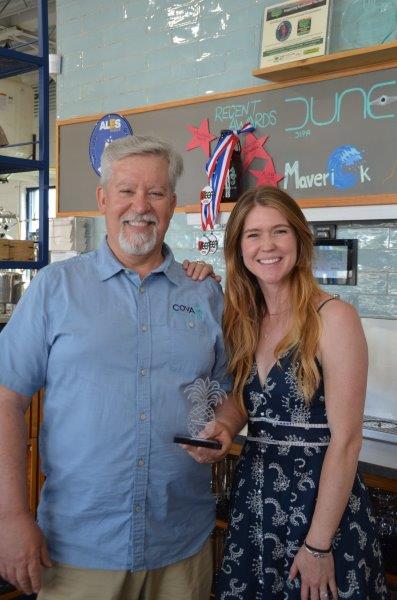
Scott & Corrie Bateman Co-Founder/Co-owner COVA Brewing Company
COVA’s commitment to quality brews, community growth and sustainability is no accident. It’s a collective effort of the team led by Scott and Corie Bateman. These two work tirelessly, serving on community boards including the Ocean View Business Association, to make this city one that will be around for future generations to live and thrive in.
– Nominated by Scott Bateman, COVA Brewing Co.

John Carter Sales and Catering Coordinator HIlton the Main
As our first-ever Rookie of the Year, John already has the chops of a seasoned pro. He handles everything thrown his way while serving as a welcoming face for guests at the Main. His teammates say they’re very lucky to have him around and look forward to seeing what he does in the future.
– Nominated by Jessica Clingenpeel, The Main Norfolk

Drazey Carvajal Front Desk Supervisor DOubleTree Norfolk Airport
Despite having no prior hospitality experience, Drazey impressed the higher-ups at Doubletree enough to land a part-time position at the hotel. Over the past two years, he has gone above and beyond, becoming a supervisor and an indispensable member of his team. He’s called the “driving force” for the front desk team and someone who puts others before himself. He’s noted for being compassionate and helping out without batting an eye.
– Nominated by Crystal Dickey, DoubleTree Norfolk

Chrysler Museum Visitor Services Team
Walk into the Chrysler Museum and it’s likely the door will be opened for you by one of these friendly ambassadors for the arts. During the recent Paul McCartney photo exhibition, the team greeted more than 60,000 visitors with knowledge and friendliness while ensuring guest safety. They also work weddings, festivals and have been nationally recognized for the level of service they provide.
– Nominated by Ashley Grove Mars, Chrysler Museum

Hannah Coats General Manager and Brew Master Grain
For 10 years, Hannah has worked her way up through the Hilton ranks, now serving as GM and brewmaster at Grain. Her coworkers note that she makes every day look easy and fun, thanks to her positive attitude and friendly demeanor. She creates a positive atmosphere for both staff and guests – and it shows in her employee retention and guest satisfaction stats.

F.R.E.D. Best Tourist Shuttle
F.R.E.D. may not be a person, but this electric vehicle packs a lot of personality. Offering near-daily rides (for free!) throughout the Downtown Norfolk corridor, this battery-operated, eight-seat people mover is an extension of the Downtown Public Service Ambassador program and, well, it’s a certified hit with visitors.
– Nominated by Sam Black, Downtown Norfolk

Rebecca Kelley Pastry Chef The Stockpot Norfolk
The tasty treats on display at the Stockpot in Selden Market are carefully crafted by pastry chef Rebecca Kelley, who turns out custom cakes, themed deserts, cookies and house bread with ease every day. She pulls double duty as the Stockpot’s social media coordinator and is always happy to lend a helping hand by serving as the restaurant’s Manager On Duty multiple times a week. She’s a terrific asset for Downtown Norfolk.
– Nominated by Amber Kostka, The Stockpot Norfolk

Sydney Meers Syd’s Fish Pig Cafe
Chef Syd Meers personifies “above and beyond” with the service he provides at Syd’s Fish Pig Cafe. From staying open late to cook for late-night VIPs to entertaining guests with colorful chitchat, Syd has often opened his doors on days off to provide private dining for conference officials. An award-winning chef, Meers is also an artist in his own right.
– Nominated by Wayne Callis, VisitNorfolk

Chris Perry Assistant General Manager Courtyard by Marriott Downtown Norfolk
Noted for being the “epitome of hospitality,” Chris Perry serves as the heart of the downtown Marriott. He always has a smile on his face and “bends over backwards” to help guests feel welcome. Also nominated to be the moderator/group expert on the Marriott Employee Forum on Facebook, Chris does his best to greet every guest who steps into the Marriott.
– Nominated by Brent Cosgrove, Marriott Downtown Norfolk

Carla Plummer City of Norfolk Parking
Known for her charming personality and friendly demeanor, Plummer has helped keep city parking in check for years, going above and beyond during the recent MEAC Tournament. She bagged meters and spent three hours assisting by keeping spaces open during the opening night reception. Carla retires in October and is well deserving of this honor. – Nominated by Jennifer Lopez, Visit Norfolk
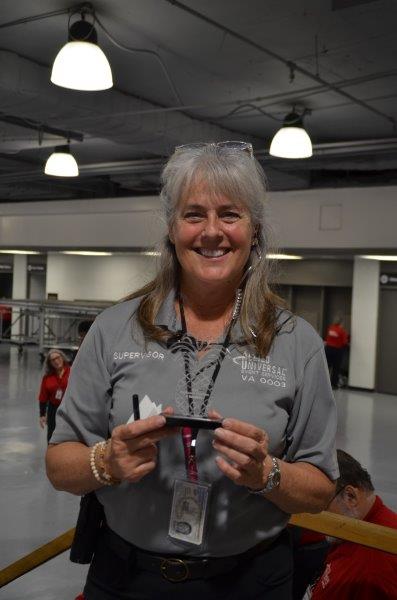
Mary Ryder Supervisor Allied Universal Security Services
At a recent show, Mary assisted a young man who was experiencing sensory/anxiety issues. She checked on him and offered to reseat him on a lower level where he could – and did – enjoy the rest of the show. Mary went out of her way to ensure the entire family had an enjoyable evening, going far above and beyond her job description. – Nominated by James Ball, VisitNorfolk

Lori Santiago Bell Person The Main
Walk in to the Main and it’s likely you’ll see the warm smile of Lori Santiago greeting you. She’s always dressed for the occasion, wearing themed outfits to welcome guests daily. It’s hard to beat the first impression Lori offers to guests walking into the Main, whether it’s for the first time or their hundredth time.
– Nominated by Stacy Lisborg, The Main Norfolk

Dave Walker Operations Supervisor Downtown Norfolk Council
For 25 years, Dave Walker has served as a dedicated member of the Ambassador team for the Downtown Norfolk Council. He’s always ready to lend a helping hand and direct visitors to where they want to go. He also keeps the streetscape clean and safe while dropping serious knowledge about Downtown for locals and visitors alike.
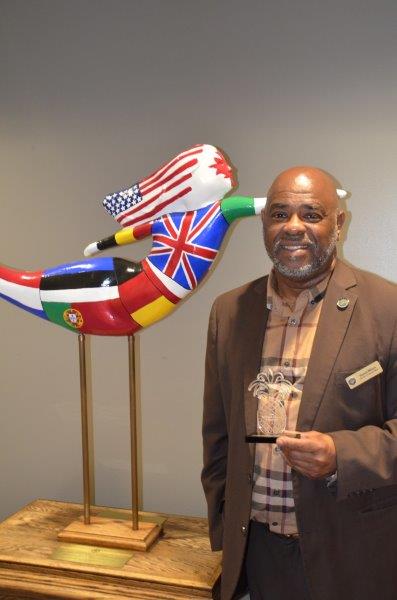
Vinson M Wilson Supreme Allied Commander Transformation ACT/NATO
For 20 years, Vinson has served ACT/NATO in the Protocol Office. He supported all NATO Events for General Philippe Lavigne, SACT Commander and has been an inspiration to his colleagues and team. Vinson is a previous Hospitality Champion, having won in 2009.
– Nominated by NATO Protocol Staff
You May Also Like
Things to do for father's day in norfolk, va, group tours through prince william, norfolk and outer banks, bikeable norfolk, student tour itinerary: explore norfolk.
Travel Disruptors: Sonder’s Francis Davidson on the future of hospitality
Francis Davidson, Sonder’s cofounder and CEO, never thought he’d start a company. “I didn’t know I had the entrepreneurial gene in me,” he says. But subletting his student apartment one summer while attending Montreal’s McGill University eventually led him to manage a portfolio of short-term rental spaces—often handling booking, guest services, and housekeeping himself. In 2014, with his accommodations holdings rapidly expanding, Davidson incorporated the business.
Sonder (rhymes with “wander”) attempts to combine the reliability and sheen of a luxe international hotel with a tech-forward vibe. The company has so far focused on urban markets, but Davidson harbors grand ambitions. “We hope to make a dent in resorts, vacation destinations, and every other kind of accommodation,” he says. “The opportunity is to revolutionize hospitality, full stop.” Sonder went public on Nasdaq in early 2022 and now does business in more than 40 cities in ten countries.
In this installment of Travel Disruptors , Davidson spoke with McKinsey’s Ryan Mann about learning from legendary hoteliers, using technology to transform the guest experience, and creating brands that draw on travel’s narrative power. Their conversation has been edited for length and clarity.
McKinsey: What’s the difference between what Sonder provides and what you’d see from a traditional hotel chain or a short-term rental company?
Francis Davidson: Design is one differentiator. The main difference from a big-box, chain hotel room is that Sonder makes you feel like you’re in a boutique accommodation. We’ve taken great inspiration from some of the best boutique hotels and most beautiful, well-architected buildings. You’ll see beautiful art on the walls, sculptural furniture, and interesting colors and patterns. Our locations also have a sense of place, speaking to the design and architecture typical of their city or country.
The difference from a short-term rental—a mom-and-pop–run accommodation—is that we offer standards of consistency and quality that you typically don’t get within that category. So you’ll see crisp white linen, stacked towels, and great soaps and shampoos.
Tech is another area that differentiates us. Interactions with our guests have been modernized. We have a guest app that allows you to get service at your fingertips 24/7. You can request an early check-in or late check-out on the app. You can call an Uber from the app when you’re at the airport and the app will automatically load your Sonder destination. There are a variety of integrations that make our service seamless, high quality, and consistent.
We power the business using tech to elevate the hospitality experience while also putting that experience within reach of the majority of consumers. We’ve leveraged technology in ways that let us offer our experiences at really affordable price points. When you bring these things together—a boutique accommodation, elevated design, standards of quality and consistency, all at a price point that’s affordable—it makes for a compelling value proposition for the guest.
McKinsey: When you think about potential new properties, how do you identify them? What are you looking for in terms of location, style, and lease terms?
Francis Davidson: The ambition of Sonder is to become the leading hospitality company globally. But there are key questions as we expand. What is the right sequencing? Which markets should we launch in first? Which kinds of properties should we look for that will allow us to scale as efficiently as possible?
Typically, we launch in markets that are near each other, because the vast majority of travel isn’t over long distances. People tend to travel more regionally than they do far away. This expansion pattern also means we have operations that we can leverage nearby. Operating efficiency is really important in delivering our mission.
When it comes to specific assets, we think a lot about design and architecture. All our decisions pass through an internal review committee made up of various functions across the company. Another important part of the criteria is our economic threshold. As a business, we are very much focused on capital efficiency, and we have certain hurdles when it comes to payback periods, margins, and the lifetime value of a deal. We have robust underwriting, with hurdles that we must clear in order to move forward with an asset.

The future of hotels: Customized experiences, sustainable practices
When a deal has compelling unit economics, with a guest experience that aligns with our brand, in a market that makes logical sense given our existing map, then we get really excited about that growth opportunity.
McKinsey: Sonder is a tech-led hospitality company. How is technology shaping next-generation hospitality experiences for travelers?
Francis Davidson: When it comes to technology that modernizes the way a hotel is operated, there’s immense white space. The way hotels have operated for the last 40 years hasn’t changed a ton.
For example, property management systems today are still, by and large, on-premises pieces of software. There hasn’t been a shift to the cloud. There are a lot of things that are still done manually by hospitality workers—whether it’s check-in or handling guest requests—that could be streamlined and automated for the benefit of the guests. You shouldn’t need a labor-intensive process just to get someone through the door or to answer a basic request. In the traditional hospitality world, either you do things face-to-face by going down to the front desk or you pick up a physical phone in the room and push something on that keypad that will connect you to a live agent. We’ve tried to transpose these interactions to the modern era by automating them and handling them through text messaging on our app. You should be able to use your own phone to unlock your door and to send requests. Standing in a check-in line and picking up the room phone to order room service feel like dated parts of the hospitality experience. You would expect it to be far more modern by now.
This is something that’s especially important to the customer base we focus on—primarily millennials and Gen Z, who are going to be the majority of travelers shortly. We build our guest experience for this digitally native generation that much prefers the frictionless experience you get by having instantaneous, tech-driven service and design-forward spaces.
McKinsey: Are you seeing more growth and interest recently from business travelers or from leisure travelers?
Francis Davidson: Sonder’s customer base has historically been focused on leisure. But in 2021, we launched our business travel program, and we’ve seen really strong growth so far. With economic uncertainty, most businesses are thinking, “Is there a way I could be more efficient on my travel dollar spend?” One segment that works well for us on the business travel side is extended trips. Think about a film crew on a long shoot, for example. It can be challenging to stay in a hotel room. Our apartment-style product fits particularly well: you have a washer and dryer and a kitchen, so you can do your own laundry and cook your own meals.
McKinsey: How do you address the typically lower-margin, higher-cost structure of hospitality?
Francis Davidson: One element that helps us be substantially more efficient is the physical footprint of our buildings. Often, hotels have lobbies that are way too large, which means there’s too much space that’s used unproductively. We tend to have much smaller lobbies at Sonder.
We also use self-serve approaches to operate more efficiently and then pass those savings on to guests. For instance, when guests arrive early or want to check out late, they need a place to store their luggage. Instead of doing that with a front-desk agent, we have well-designed luggage lockers. There’s another self-serve space where you can find extra towels and toilet paper. All of this is presented to the guest through our digital channels so that we point our guests toward these self-serve pieces of infrastructure that exist within our buildings.
We also outsource to high-quality food and beverage operators. We know that running a good restaurant is challenging. Most midscale and even upscale hotels struggle to do that well. What we do instead is find local food and beverage operators and then integrate with them to make sure that they can provide their experience to our guests in a seamless fashion, without us having to take on that operational burden.
McKinsey: Design is a critical component for Sonder. How do you think about the role of design in travel? How do you use it to differentiate your brand?
Francis Davidson: Design is incredibly important for the hospitality business. There’s been a generational shift, maybe because of the rise of Instagram, and we see that design is now one of the major drivers of decision making for next-generation travelers. There’s a sense of pride that they get when they stay at a really well-designed place. They’re going to take a photo. Maybe they’re going to post it online.
One of my favorite books, Alain de Botton’s The Architecture of Happiness , 1 New York, NY: Vintage Books, 2008. goes into great detail about how well-architected buildings could lead to a more fulfilled life. We’ve tried to take lessons from various architects, industrial designers, and artists so that we can bring their ideas to hospitality outlets that democratize access and are available to the many. This follows the trend set by the midcentury modern movement, when designers such as Charles and Ray Eames were saying that design should be within reach for all.
McKinsey: At McKinsey, we talk a lot about how, over the past couple of years, travel was taken away from people—and that made them appreciate it even more. How do you think the pandemic has changed hospitality?
Francis Davidson: The pandemic has accelerated the adoption of new guest-facing technology by, probably, a decade in the course of a couple of years. Things like contactless check-in, mobile keys, and housekeeping that’s by request only—these have come about much more rapidly as a result of the pandemic. Those things are also aligned with our general approach. We think that this was the inevitable path that hospitality was headed toward; it’s just been accelerated.
The pandemic has accelerated the adoption of new guest-facing technology by, probably, a decade in the course of a couple of years.
McKinsey: What’s your vision of what the future of travel will look like? What are future travelers going to want from their hospitality experiences?
Francis Davidson: I think what you’re going to see is extremely aspirational hospitality being available to the many. There’s no reason why a beautiful space should cost four or five times more than a humdrum space. With the help of technology, there’s no reason why service shouldn’t be instantaneous, 24/7, and just as good as service at the best five-star hotels—but at a three-star price point. I think what we’re going to see is an upleveling of the quality of the customer’s experience as the industry gets much more efficient.
I also think we’re going to see the rise of very powerful consumer travel brands. The opportunity for storytelling in travel is enormous. Almost everyone, when they take time off, the first thing they think about is “Where can I go? How can I travel and explore the world?” It’s something that pretty much everyone loves to do. But the most powerful brands that exist in the world today are brands that sell things that don’t have anywhere close to the strong narrative power that travel has. I’m hoping that over the next couple of decades, we’re going to see the emergence of many superbrands within travel.
McKinsey: What’s been your most unexpected lesson so far?
Francis Davidson: Initially, we were going to do everything our way and start from scratch. Then we realized that, in many instances, we were trying to reinvent the wheel. We could do a better service to the future of hospitality by adopting existing best practices when a system has been optimized, so that we can concentrate on things that we actually want to change.
I read the biography of Kemmons Wilson, the founder of Holiday Inn. There are immense lessons to be learned from it. He built an amazing all-American company that then became an international success. There are other examples of people—Conrad Hilton, the Marriott family—who have done extraordinary things in the world of hospitality that we ought to study and understand. It’s about being humble and finding a delicate balance between respecting the status quo and, at the same time, wanting to improve and disrupt it.
McKinsey: What are your favorite moments on the job?
Francis Davidson: My favorite moments are the times when we’ve faced an immense crisis and managed to pull the team together and get through it. Sonder shouldn’t really be around now after the pandemic. We’re a hypergrowth company that is dependent on travel demand, which completely evaporated overnight. That was really hard, and not all companies in the space made it. We found a way to keep our properties occupied by pivoting to extended stays of 14 days or more, which provided the vast majority of our revenue within a few weeks. It was an extremely intense project that we pulled off—landing pages, marketing, pricing models, sales, new distribution channels. All of that happened within a matter of days. We managed to launch this in March of 2020, within the first few weeks of the pandemic. It saved the business.
I think very few people realize the upside of a crisis when it’s happening, because it’s so scary. It could be demotivating in that moment. But when it works out, and you look at it from the other side, it generates immense pride.
Francis Davidson is the cofounder and CEO of Sonder. Ryan Mann is a partner in McKinsey’s Chicago office.
Comments and opinions expressed by interviewees are their own and do not represent or reflect the opinions, policies, or positions of McKinsey & Company or have its endorsement.
This interview was edited by Seth Stevenson, a senior editor in the New York office.
Explore a career with us
Related articles.

The snap back of travel: Airlines’ ability to keep pace

US summer travel 2022

Tourism in the metaverse: Can travel go virtual?
- Your Profile
- Your Subscriptions
- Support Local News
- Payment History
- Sign up for Daily Headlines
- Hospitality, Marketing & Tourism
Soaring costs force Vancouver restaurants to close

- Share by Email
- Share on Facebook
- Share on LinkedIn
- Share via Text Message
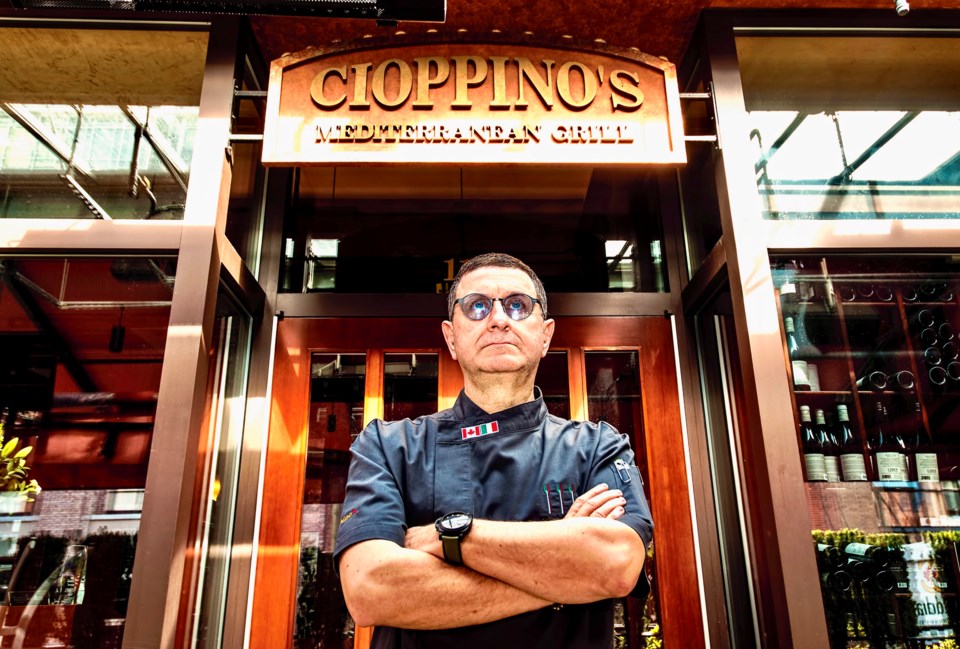
Dozens of restaurant closures have ravaged Metro Vancouver’s dining scene this year.
That hollowing out is set to continue as all restaurant owners grapple with higher costs. The burden is particularly acute for smaller restaurateurs and those with a single location.
The pitter-pat of recent closures include the 12-year-old brunch eatery Heirloom , the seven-year-old vegetarian eatery The Arbor and the drink-forward Japanese bistro Black Rice Izakaya .
Decades-old fixtures have closed, such as Mary’s On Davie in March .
Cioppino's Mediterranean Grill & Enoteca co-owner Pino Posteraro announced at the Vancouver Magazine Restaurant Awards that he plans to close his 25-year-old Yaletown destination .
He called it “bittersweet” to win the magazine’s award for Best Italian – Upscale.
Awards aside, the hard truth was that the restaurant was losing money, and that this was too much for Posteraro, who owns a minority stake in the venture, and for his business partner, who owns the majority stake, he told BIV in an interview yesterday.
“This last year was the year that we were not able to be profitable,” he said. “Some months were better, but overall, it was negative.”
Posteraro said his restaurant’s rent is $60,000 per month and that this rate is high enough to make the business unviable when other prices are also rising.
“Everything costs more,” he told BIV . “Look at the prices for vegetables. Look at the cost of beef. It’s very hard to be profitable.”
The problem, he said, is not that his landlord intends to dramatically hike his rent when his lease expires at the end of October, but rather that the rent is already too high.
Posteraro convinced his landlord to let him stay until the end of December. He has no specific plans for what to do after the restaurant closes, although he mentioned spending more time with family.
“It's a busy time of year, and we have reservations until then,” Posteraro said of his decision to keep the restaurant open until December. “The landlord has been very kind to do an extension of the lease.”
He has made it a hallmark to provide extras to customers.
Cioppino’s provides patrons with fresh bread and a chickpea spread for free, he said. If there is a celebration at a table, the restaurant provides a free dessert.
Posteraro said he did not want to change those practices.
Costs will only increase at the end of the month, as B.C.’s minimum wage is set to rise by 3.9 per cent, to $17.40, from $16.75 , on June 1.
The Canadian Federation of Independent Business released a report this morning saying that if the B.C. government were to mandate a $20 “living wage,” it would put up to 75,500 small businesses at risk of becoming unprofitable – something that would prompt business closures.
“When restaurants are not profitable for us, we shut them down,” Glowbal Restaurant Group principal Emad Yacoub told BIV yesterday.
“I shut down Trattoria at Park Royal last month .”
The devastation for restaurants was predicted.
Between 10 and 14 per cent of more than 15,000 restaurants in the province could close as a result of the federal government not extending its deadline for repaying pandemic-era Canada Emergency Business Account loans, BC Restaurant and Foodservices Association CEO Ian Tostenson told BIV last year.
Restaurateurs face challenging B.C.'s business climate
Yacoub said he now operates eight restaurants, including one in Toronto . “I’m working on opening two more in Ontario.”
Yacoub is not interested at this time in opening more restaurants in B.C. because of the business climate, he said.
He was recently offered the chance to buy a Michelin-ranked restaurant in Vancouver, but he passed up the opportunity, he said, adding that he could not disclose the name of the restaurant because he signed a confidentiality agreement.
“Big guys like me, we can weather the storm because we're like a machine and we know how to bring people to restaurants,” he said. “Small businesses in B.C. are struggling. It's not easy making money anymore in B.C.”
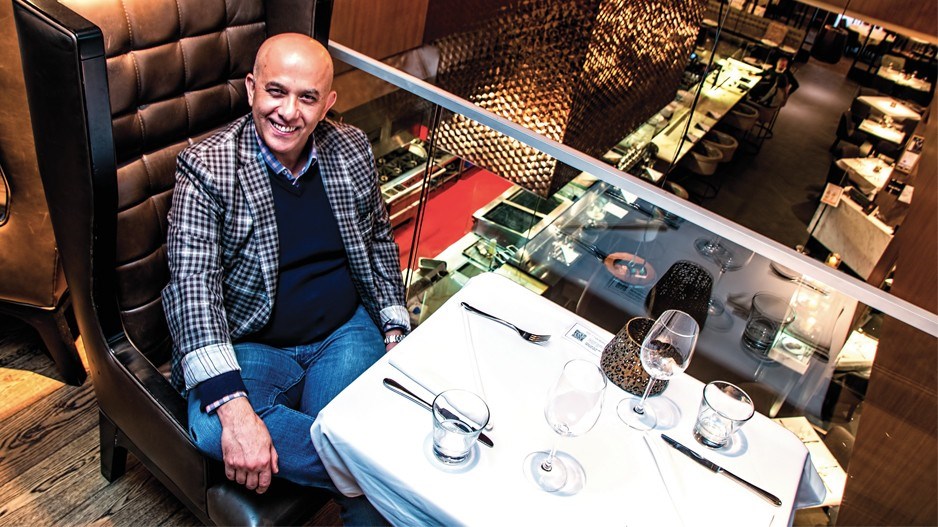
Global Restaurant Group principal Emad Yacoub sits at his Glowbal restaurant at 590 West Georgia | Chung Chow, BIV
One of his restaurants – the Trattoria in Burnaby – has a lease soon up for renewal and Yacoub said he is working with the landlord to renew that lease.
Many of his well-known downtown Vancouver restaurants, such as Glowbal on West Georgia Street, Black+Blue and The Roof on Alberni Street and Italian Kitchen on Burrard Street , do not have leases up for renewal in the near term, he said.
“I am sitting in a good place,” he said. “But I know how much money I was making and I know how much money I'm making right now. We're not making the money that we used to make before. The reason is because the cost of everything went up sky high and it's very difficult to make money in B.C.”
Yacoub has dabbled in real estate. In 2014, he sold a property at 1328 Hornby Street to longtime restaurateur Umberto Menghi. Yacoub had operated the unsuccessful IK2GO fast-food bistro at the site , and Menghi was interested in not only buying the property but also opening the 5,000-square-foot, 240-seat high-end Italian eatery Giardino . The site is about half a block north of where Menghi for 37 years operated the similarly named Il Giardino restaurant, which followed a few years of operating other restaurants on that site .
Menghi yesterday told BIV that his restaurant is doing OK. Traffic is steady, although patrons sometimes cut back on how much they spend.
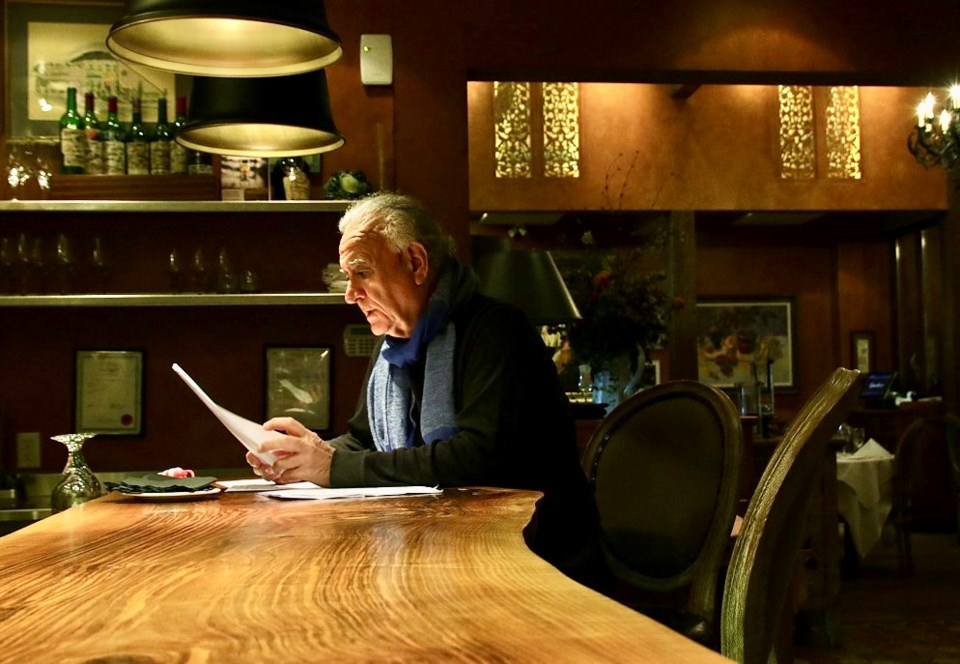
Giardino owner Umberto Menghi examines papers at his restaurant during the early days of the pandemic | Rob Kruyt, BIV
Regardless of how much his customers spend, Menghi makes less money because costs have increased and he has not raised prices to compensate, he said.
He does not want to push prices up so high that customers decide not to visit.
His average customer spends between $160 and $170, he said. That would put the price for a couple at around $330, so he does not want to risk having that couple decide to go to another high-end restaurant.
While Menghi is likely best remembered for his Il Giardino restaurant, which included a heritage house, he has operated many restaurants through the decades.
One venture was a fast-casual chain dubbed Umbertino’s.
He sold his Whistler-based Il Caminetto restaurant to the Aquilini Investment Group’s Toptable Group in 2017 .
Menghi also provided early guidance to Posteraro as Posteraro worked at Il Giardino before he opened Cioppinos in September 1999.
[email protected]
twitter.com/GlenKorstrom
- Oldest Newest
This has been shared 0 times

UK Edition Change
- UK Politics
- News Videos
- Paris 2024 Olympics
- Rugby Union
- Sport Videos
- John Rentoul
- Mary Dejevsky
- Andrew Grice
- Sean O’Grady
- Photography
- Theatre & Dance
- Culture Videos
- Fitness & Wellbeing
- Food & Drink
- Health & Families
- Royal Family
- Electric Vehicles
- Car Insurance Deals
- Lifestyle Videos
- UK Hotel Reviews
- News & Advice
- Simon Calder
- Australia & New Zealand
- South America
- C. America & Caribbean
- Middle East
- Politics Explained
- News Analysis
- Today’s Edition
- Home & Garden
- Broadband deals
- Fashion & Beauty
- Travel & Outdoors
- Sports & Fitness
- Sustainable Living
- Climate Videos
- Solar Panels
- Behind The Headlines
- On The Ground
- Decomplicated
- You Ask The Questions
- Binge Watch
- Travel Smart
- Watch on your TV
- Crosswords & Puzzles
- Most Commented
- Newsletters
- Ask Me Anything
- Virtual Events
- Betting Sites
- Online Casinos
- Wine Offers
Thank you for registering
Please refresh the page or navigate to another page on the site to be automatically logged in Please refresh your browser to be logged in
‘Kink tourism’ is on the rise – but does it live up to the hype?
Curious to see how the hospitality industry is embracing eroticism, jordan gray and her wife checked into london’s the mandrake hotel with its new high-end ‘kink concierge’ service – and found a world of mischief, sensuality and exploration, article bookmarked.
Find your bookmarks in your Independent Premium section, under my profile

T here is something new and mysterious going down at this five-star Fitzrovian Hotel.
As if its shadowy provocative exterior, nestled halfway down Newman Street, doesn’t evoke a sense of darkly playful mischief, I will tell you, as a newly minted Tribe Member, that there’s more going on within the walls of The Mandrake than meets the (literal) eye.
“Kink tourism” is on the rise. There is a heightened discourse around the benefits of sexual exploration. Couples (and singles alike) are taking ever-more extravagant ownership over their erotic adventures – and the hospitality industry has responded. Hôtel Amour ( Paris ) comes replete with a feast of phallic paraphernalia. Hedonism II ( Jamaica ) is a couples-only resort that offers either a ‘rude’ or ‘prude’ package, depending on your penchant for nudity. The Erotic Suite at The Palms Casino Resort ( Las Vegas ) boasts mirrored ceilings, an 8ft rotating bed and a dancing pole in the shower. It’s all good fun… but where’s the nuance?
Join our commenting forum
Join thought-provoking conversations, follow other Independent readers and see their replies
Subscribe to Independent Premium to bookmark this article
Want to bookmark your favourite articles and stories to read or reference later? Start your Independent Premium subscription today.
New to The Independent?
Or if you would prefer:
Want an ad-free experience?
Hi {{indy.fullName}}
- My Independent Premium
- Account details
- Help centre

COMMENTS
Hospitality and tourism are both related and separate industries. For instance, airline travel is considered as part of both the tourism and hospitality industries. Hospitality is a component of the tourism industry, as it provides services and amenities to tourists. However, tourism is a broader industry encompassing various sectors, including ...
Tourism is a social, cultural and economic phenomenon which entails the movement of people to countries or places outside their usual environment for personal or business/professional purposes. These people are called visitors (which may be either tourists or excursionists; residents or non-residents) and tourism has to do with their activities ...
The hospitality and tourism cluster includes many entry-level opportunities that can build toward higher-level positions. For example, an entry-level worker may start restaurant work as a dishwasher or table busser and eventually move into cooking, waiting tables, or even management. Many opportunities under this cluster do not require training ...
The hospitality and tourism industry is a vast sector that includes all the economic activities that directly or indirectly contribute to, or depend upon, travel, tourism and hospitality. This industry sector includes: Hotels & Resorts. Restaurants & Catering. Night Clubs & Bars. Travel & Transportation.
The hospitality industry is a large subsection within the service industry and is comprised of four main areas: Food & beverage, travel & tourism, lodging, and recreation.As examples, the F&B category includes restaurants, bars, and food trucks; travel & tourism covers different forms of transportation and travel agencies; lodging varies from hotel resorts to hostels; recreation refers to ...
Tourism jobs include destination management, tour package design, personal travel planning, tour coordination, and a certain amount of special event planning. In fact, the tourism industry becomes complex as coordinated events are further integrated into hospitality and travel packages. If you enjoy many aspects of the hospitality world ...
Accommodation and Lodging The Hospitality Industry. When looking at tourism it is important to consider the term hospitality. Some define hospitality as "the business of helping people to feel welcome and relaxed and to enjoy themselves." [7] Simply put, the hospitality industry is the combination of the accommodation and food and beverage groupings, collectively making up the largest ...
Hotel management is a type of hospitality administration. You'll find that most hospitality businesses fall under one of five key categories: Food and beverage. Lodging. Meetings and events. Recreation. Travel and tourism Career paths in hospitality management A background in hospitality management may open a variety of job opportunities.
tourism, the act and process of spending time away from home in pursuit of recreation, relaxation, and pleasure, while making use of the commercial provision of services.As such, tourism is a product of modern social arrangements, beginning in western Europe in the 17th century, although it has antecedents in Classical antiquity.. Tourism is distinguished from exploration in that tourists ...
Hospitality management degrees are, foremost, degrees in business, says Michael Sabitoni, chair of the food and beverage management department and the international travel and tourism studies ...
Hospitality is a field that focuses on providing accommodations to visitors at hospitality-related industries, such as hotels, motels, restaurants, cruise ships, country clubs, casinos, and convention centers, while tourism is focused on providing quality attractions and events in order to entice tourists to come.
The Hospitality Management degree program offers thorough studies of theoretical and practical management skills, hospitality business law, and food and beverage management. Whereas, hospitality and tourism management degree programs aim to develop student's skills in the areas of marketing, purchasing, budgeting, and cost control.
If you are interested in a career in Hospitality and Tourism here is a list of 5 majors you might consider when thinking about your degree options. Hotel and Motel Management. Students in this major learn how to manage hotels, motels, and other lodging businesses such as resorts. Course work covers hospitality law, employee management ...
The hospitality industry is a large subsection within the service industry and is comprised of four main areas: Food & beverage, travel & tourism, lodging, and recreation. As examples, the F&B ...
The hospitality industry is a massive business sector. Casting a broad umbrella, it encompasses all economic and business activities that rely upon or contribute to travel and tourism. Hospitality-focused businesses like hotels and travel agencies contribute directly by providing essential services that enable travel and tourism.
What is the job outlook for hospitality management? The coronavirus pandemic greatly affected the leisure and hospitality industry, but this sector is bouncing back in India. By 2027, experts predict income from India's travel and tourism market will grow to (US) $125 billion as compared to roughly (US) $75 billion in 2020 . Therefore, the job ...
The BS in Hospitality, Travel and Tourism Management will prepare you for a range of hotel industry jobs and career paths. You will have the opportunity to specialize in your field of interest, including hotel or tourism operations, sales and marketing, revenue management or hotel development. Our students secure internships and work at large ...
Hospitality is internationally relevant and a powerful economic driver, and Purdue's hospitality and tourism management major equips you with valuable skills to create memorable experiences for consumers. Coursework is challenging and relevant to today's workforce needs, and you'll learn from faculty who bring years of industry experience ...
Travel, Tourism & Hospitality. Leading global travel markets by travel and tourism contribution to GDP 2019-2022. Travel, Tourism & Hospitality. Travel and tourism employment worldwide 2019-2033.
Tourism and Hospitality Research (THR) is firmly established as an influential and authoritative, peer-reviewed journal for tourism and hospitality researchers and professionals. THR covers applied research in the context of Tourism and Hospitality in areas such as policy, planning, performance, development, management, strategy, operations, marketing and consumer behavior…
They may also benefit from earning an associate degree or bachelor's degree in hospitality and tourism. 8. Tour manager. Find tour manager jobs National average salary: $52,462 per year Primary duties: Tour managers oversee tour bookers, tour guides, tour bus drivers and marketing staff for a tour company.
More hotels are catering to the 'bleisure' — business and leisure — traveler "Bleisure" is a new term in hospitality, a combination of business and leisure travel. It's part of a post-pandemic ...
Po-Ju Chen, Ph.D., a Fulbright Scholar, recently joined the Department of Hospitality, Hotel Management and Tourism in the Texas A&M College of Agriculture and Life Sciences as a professor. "We are fortunate to have Dr. Chen's expertise and academic accomplishment in hospitality and tourism added to our newly re-formed department ," said ...
Katerina Berezina is an Associate Professor in the Department of Nutrition and Hospitality Management and Director of the Hospitality Management Program at the University of Mississippi (USA). Dr. Berezina's research interests are in the areas of information technology in hospitality and tourism, electronic distribution, and revenue management.
As the third largest economic driver for our city, the travel and tourism industry mobilized a $149.7 million impact in fiscal year 2023. With over 7,000 jobs in the tourism and hospitality sector, our industry attracts a multitude of talents and provides significant economic benefits to both local businesses and Norfolk residents.
Tourism jobs include destination management, tour package design, personal travel planning, tour coordination, and a certain amount of special event planning. In fact, the tourism industry becomes ...
Sonder went public on Nasdaq in early 2022 and now does business in more than 40 cities in ten countries. In this installment of Travel Disruptors, Davidson spoke with McKinsey's Ryan Mann about learning from legendary hoteliers, using technology to transform the guest experience, and creating brands that draw on travel's narrative power.
Costs will only increase at the end of the month, as B.C.'s minimum wage is set to rise by 3.9 per cent, to $17.40, from $16.75, on June 1. The Canadian Federation of Independent Business ...
Curious to see how the hospitality industry is embracing eroticism, Jordan Gray and her wife checked into London's The Mandrake Hotel with its new high-end 'kink concierge' service - and ...